You control your data
We and our partners use cookies to provide you with our services and, depending on your settings, gather analytics and marketing data. Find more information on our Cookie Policy . Tap "Settings” to set preferences. To accept all cookies, click “Accept”.
Cookie settings
Click on the types of cookies below to learn more about them and customize your experience on our Site. You may freely give, refuse or withdraw your consent. Keep in mind that disabling cookies may affect your experience on the Site. For more information, please visit our Cookies Policy and Privacy Policy .
Choose type of cookies to accept
These cookies allow us to analyze our performance to offer you a better experience of creating resumes and cover letters. Analytics related cookies used on our Site are not used by Us for the purpose of identifying who you are or to send you targeted advertising. For example, we may use cookies/tracking technologies for analytics related purposes to determine the number of visitors to our Site, identify how visitors move around the Site and, in particular, which pages they visit. This allows us to improve our Site and our services.
These cookies give you access to a customized experience of our products. Personalization cookies are also used to deliver content, including ads, relevant to your interests on our Site and third-party sites based on how you interact with our advertisements or content as well as track the content you access (including video viewing). We may also collect password information from you when you log in, as well as computer and/or connection information. During some visits, we may use software tools to measure and collect session information, including page response times, download errors, time spent on certain pages and page interaction information.
These cookies are placed by third-party companies to deliver targeted content based on relevant topics that are of interest to you. And allow you to better interact with social media platforms such as Facebook.
These cookies are essential for the Site's performance and for you to be able to use its features. For example, essential cookies include: cookies dropped to provide the service, maintain your account, provide builder access, payment pages, create IDs for your documents and store your consents.
To see a detailed list of cookies, click here .
This site uses cookies to ensure you get the best experience on our website. To learn more visit our Privacy Policy
- Resume Examples
- Military to Civilian Resume Examples & Template for Veterans

Military to Civilian Resume Examples & Template for Veterans

Our customers have been hired by:
Tired of sending out your military resume and not receiving a reply from employers?
You’re not alone. 5.3 million of Americans have served as active-duty soldiers since the Gulf War era, and thousands are now facing the difficult transition into civilian life and employment.
Want to be the lucky one getting those interviews? Learn how to write a military resume for a post-military career that will translate your military experience into skills and achievements civilian employers can understand.
This guide will show you:
- A military resume example better than 9 out of 10 civilian resumes.
- How to write a military to civilian resume that will land you more interviews.
- Tips and examples of how to put skills and achievements on an ex military resume.
- How to describe your experience on a military resume for a civilian job of your dreams.
Want to save time and have your resume ready in 5 minutes? Try our resume builder. It’s fast and easy to use. Plus, you’ll get ready-made content to add with one click. See 20+ resume templates and create your resume here .
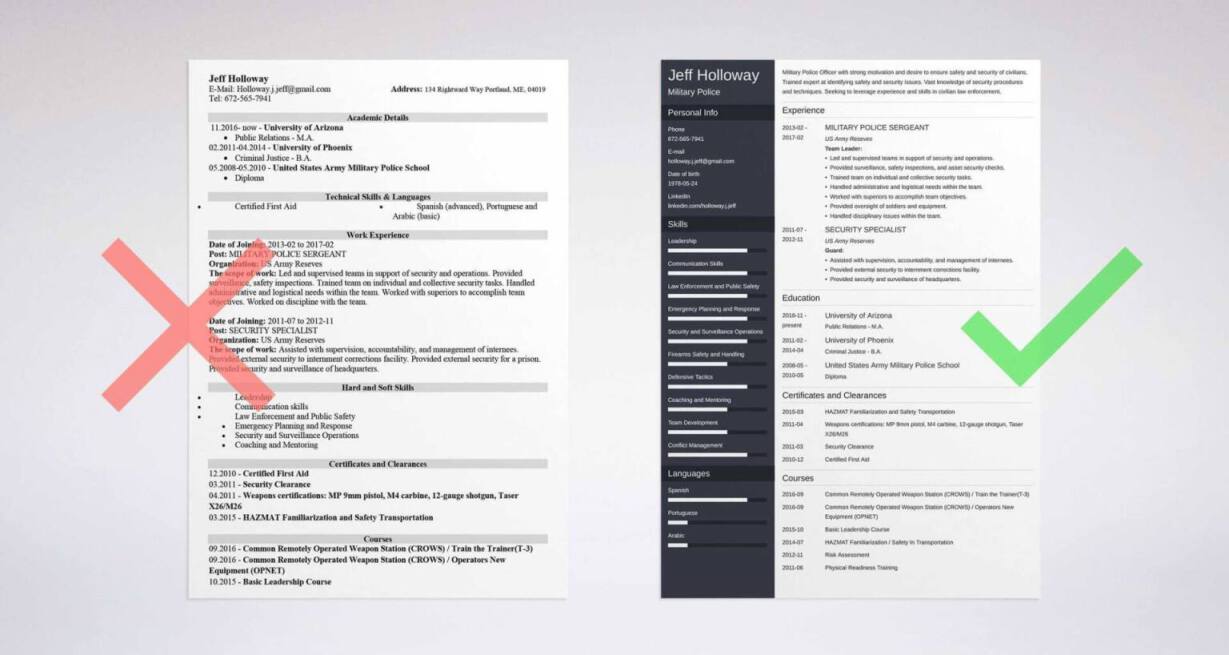
Sample resume made with our builder— See more resume samples here .
Looking for a different resume example? See:
- Federal Resume Samples
- Pilot Resume Samples
- Resume for First Job
- Resume for Career Change
- Resume for the US
- Resume Examples for All Jobs
Military Resume Example
Project Manager
123-456-7890
linkedin.com/in/owen.lee
Dedicated Project Manager with over 10 years of experience. Seeking to support ValorForce Military Solutions increase its security efficiency by applying leadership skills and strategic planning abilities. Led a successful operation at StrategicShield Defense that increased security efficiency by 40%.
StrategicShield Defense, Vancouver, WA
June 2015–Present
Key Qualifications & Responsibilities
- Leading and trainning a team of 50 personnel.
- Developing new strategies to increase security efficiency.
- Coordinating defense operations and collaborating with external agencies.
- Liasoning with different departments, ensuring project completion within budget and deadline in 98% of cases.
Key Achievement:
- Led a successful operation that resulted in increased security efficiency by 40%.
Field Operations Officer
United States Army, Fort Hood, TX
August 2005–June 2015
- Managed and planned field operations for a unit of 75 soldiers.
- Conducted training exercises and evaluated the performance of over 500 soldiers.
- Coordinated with external agencies and supported joint military operations.
- Developed and implemented successful training programs that increased troop performance by 30%.
Bachelor of Military Studies
Washington State University, Vancouver, WA
September 2001–June 2005
Relevant extracurricular activities
- President, Military Studies Club
- Volunteer, Veterans Outreach Program
Academic achievements
- Graduated with Honors.
- Awarded Best Leadership Project.
- Strategic Planning
- Risk Management
- Team Coordination
- Communication
- Problem-solving
- Decision-making
Certifications
- Certified in Security Management, American Society for Industrial Security, 2010
- Certified in Leadership Skills, American Management Association, 2006
- 2018, Excellence in Leadership, StrategicShield Defense
- 2012, Best Training Program, United States Army
Memberships
Member of the American Society for Industrial Security since 2011
- Lectured on Security Management Strategies during the 2019 ASIS Annual Seminar, Vancouver.
- English—Native proficiency
- Spanish—Intermediate proficiency
- Writing articles about military strategies for a personal blog.
- Mentoring youngsters interested in military careers.
Here’s the Main Problem with Your Military Resume
Ex military veteran resumes contain terminology and acronyms that some recruiters might not understand.
Phrases like, “ Assistant G-3 Training Office r” and “ Battery Commander ” might be impressive in the service, but don’t mean much for potential employers.
Here is a military resume sample—
This military resume example comes for a management job from Washington’s government career portal.
What does the job experience above have to do with management? It’s hard to tell without speaking to the applicant.
The applicant won’t have a chance to explain her side of the story unless her army resume wows the recruiter.
That’s why you need to know how to write a military resume.
Need to refresh your general knowledge about how to write a resume? Not sure what to include or what’s the best military resume format? Read our guide: How to Create an Effective Resume
Your Mission, Should You Choose to Accept It
In writing a military to civilian resume, it is your mission to meet the following criteria:
- Demonstrate the civilian applications of your hard-earned military skills, accomplishments , and experiences .
- Entice recruiters and HR managers to call you for an interview.
- Serve as a guide for future job interviews.
- Prevent recruiters from doubting your ability to transition into civilian employment.
- Bridge the gap between who you were in the service, and who you want to be as a civilian employee.
How can you write military resumes for civilian jobs?
It might be easy if you’re an army medic or a Marine Corps chef.
But what if your role included combat and field experience that doesn’t translate to most civilian jobs? I’ll answer those questions and more in this guide.
When making a resume in our builder, drag & drop bullet points, skills, and auto-fill the boring stuff. Spell check? Check . Start building a professional resume template here for free .

When you’re done, our professional resume builder will score your resume and our resume checker will tell you exactly how to make it better.
Planning Your Career Path Outside the Military
It’s hard to figure out what military skills to put on a resume for a civilian job if you don’t have a career path in mind. Strategize first before you start writing a military resume.
Research occupations closest to the jobs you held while on duty. Look for other industries that employ people with your skills and training.
And if you can’t decide on one career path, that’s okay. Start by creating a military resume template for yourself that you can use as a basis for different versions of your resume.
Make a master list of your professional merits. Which of your skills, training, military awards, and education are useful for the job you’re targeting?
If you’re applying to be an accountant, the award you won in marksmanship won’t do you any good. Same goes for information about the bases where you’ve worked.
The Reality of Moving to a Different Industry
It’s hard to accept that the skills it took you years to learn aren’t going to help land your next job.
But you have to realize that everyone who moves to a new industry has this experience. A graphic designer who decides it’s time to become an Air Traffic Controller doesn’t need to put her Photoshop skills on her civilian resume. Right?
You will find it necessary to eliminate some of your experience and military skills for a resume. Focus on what’s transferable to your new role.
Not sure what skills are valued most in your new industry? Used LinkedIn to find out and to network with civilian professionals. Not sure how? Read our guide: How To Optimize Your LinkedIn Profile To Get More Jobs
Assume Your Hiring Manager Knows Nothing About the Military
Here’s the thing. You could be using language on your military veteran resume that civilian employers don’t understand. It’s normal after spending years in the military.
Recruiters and interviewers, who have no background in the military, can’t understand the lingo used in the corps.
That’s why you’ll need to translate military to civilian terms, so whoever reviews your veteran resume sees your potential.
Resume writing tips for ex military personnel:
- Avoid acronyms . Write “ Base ” instead of “ AFB .”
- Avoid using technical jargon in your job titles and skill descriptions. Write “ Supervisor ” instead of “ Non-Commissioned Officer .”
- Don’t use military code. Don’t include base or ship codes, unless it’s relevant to your target job. Use your military job title or a civilian equivalent instead of your MOS designator.
Not sure about the civilian equivalent of your military job? There are tons of sites available to convert them for you.
- CareerOneStop’s Military to Civilian Occupation Translator . It’s sponsored by the U.S. Department of Labor, so the information provided is reliable.
- O*Net OnLine’s Military Crosswalk Search
- TAOnline’s MOS Code to Civilian Occupations Translator
- Military.com’s Skills Translator
Just enter the military branch you served under, and your MOS code or job title. After that, you’ll see a list of civilian job titles and in some cases, actual open positions.
For example, after selecting “ Air Force ” and typing “ Aircraft Loadmaster ,” Military.com showed the following jobs for candidates with an air force resume :
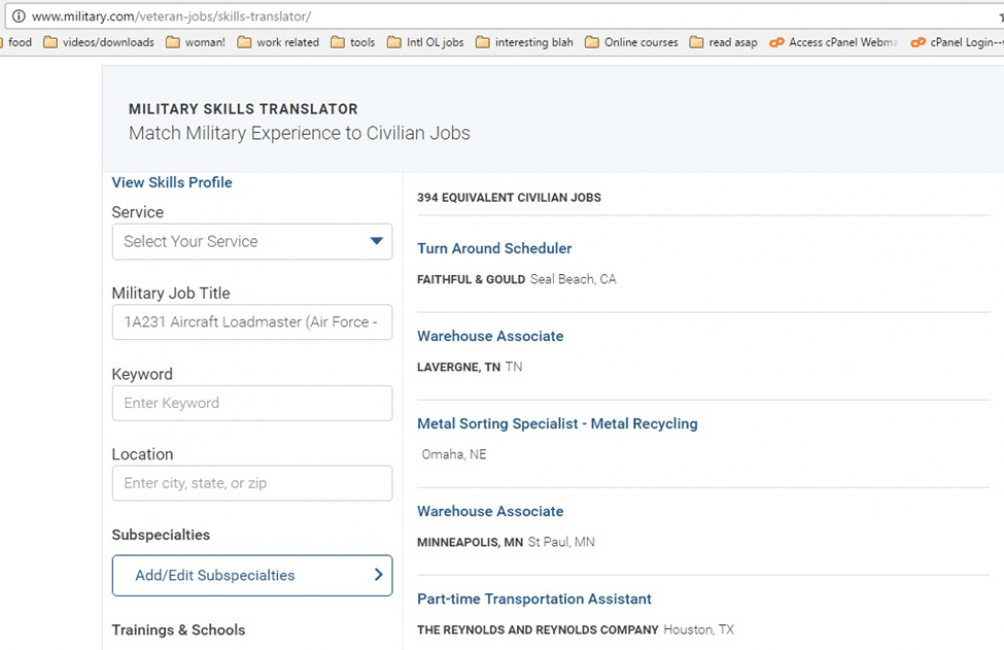
If you’re not ready to apply just yet, that’s okay.
Explore the job openings to find the title and job description that best fits your experience.
Whatever you do, don’t copy anything from these sites verbatim—aside from job titles. Paraphrase and use the power of thesaurus to aid you.
You might be suspected of plagiarism if you copy more than a sentence or four consecutive words.
On the other hand, inserting keywords from the job description into an ex military resume never hurts.
Here’s How to Create a Civilian Friendly Career Summary
Michael Richards retired after a stellar 15-year stretch of military service during which he specialized in workforce management and deployment. He’s now pursuing an executive position in HR and Talent Development.
Michael has two options when it comes to writing a resume career summary for his military transition resume. He can focus on who he was in the military or who he wants to become as a civilian.
Since your ex army resume summary is the first thing hiring managers look at, whatever Michael picks will affect his chances of landing the job.
Option A: Michael Focuses on his Military Background—
Military Resume Summary Example:
Workforce Management Director
Exceptional leader with analytical skills and talent development experience. Fifteen years in workforce management and personnel deployment for the United States Army. Assisted several Army staff agencies and commands in optimizing their workforce according to available talent resources and their mission’s priorities.
Option B: Michael Focuses on his Civilian Potential—
Civilian Resume Summary Example:
A workforce and talent development expert with 15 years of experience in sourcing, organizing, and deploying diverse talent to form top-performing teams for the United States Army. Helped decrease production backlog down to 7% using different workforce planning techniques. Created talent development programs encouraging team members to take on more responsibility.
The first veteran resume summary mentions workforce management, talent development, and leadership experience.
But the hiring manager might have no idea if workforce planning in the army is the same in corporate offices.
Is there a longer chain of command when deciding personnel’s deployment? Is there a more red tape? What tools are used?
It also lacks keywords from the job description that hiring managers want to see.
Try to anticipate what questions a hiring manager might have after reading your military to civilian resume. Then find a way to address these questions on your post-army resume or in your cover letter. Addressing these questions is crucial for military resume writing.
The second example mentions that Michael’s military experience is limited to the United States Army, but it elaborates on his transferable skills and responsibilities.
Pro Tip: You need to add keywords from the job description . Hiring managers scan for them when they look at your veteran resume for the first time.
Don’t know how to tailor a military resume to a job description? Want to know what keywords are the most valuable? Read our guide: 6 Proven Tips On How To Tailor Your Resume To The Job Description
Demilitarize Your Work History and Skills
Don’t limit your army experience to the core functions of your role. Think about other experiences and skills you gained as part of the job.
Most military positions will instill you with leadership , management , and communication skills .
Attention to details and the ability to work under duress are part of the package too. You just need to emphasize them.
Below is a sample navy resume, from Timothy Stergiou-Allen , Veteran Naval Officer from the UK.
You’ll notice it’s stripped of military jargon. If “ Royal Navy warship ” and “ NATO deployment ” wasn’t mentioned, this military resume example could be mistaken for the resume of a civilian PR professional.
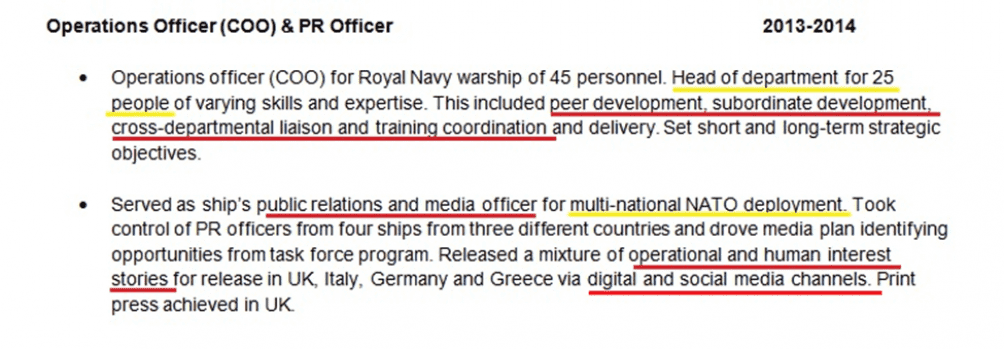
Aside from specific accomplishments (highlighted in yellow), the sample military resume also explains Stergiou-Allen’s transferable skills as a PR officer and COO (highlighted in red).
Adding peer development and training coordination suggests he knows how to mentor others and conduct training sessions. Releasing stories via digital and social media channels means he’s familiar with the tools used for digital marketing.
Here’s another military resume example:
Security Specialist – U.S. Marine Corps 2008 to 2011
- Led and mentored a diverse team of 25 people, attaining a 5% increase in promotions and 20% decrease in turnovers.
- Received recognition for reporting and documentation accuracy.
- Achieved a “zero loss” period in 3 years of managing the security of different equipment worth $125,000
When you read " security specialist, " you might think of military or private protection services.
But that’s not the case.
Transferable skills , such as mentoring, documentation, and security management, are good candidates for financial and management jobs. That’s because integrity and accurate reporting are mandatory.
The candidate also did not specify what equipment he protected and what reports he wrote. Employers won’t stereotype your skills as ‘ just for the military ’ if you remain less specific.
Below is a sample military resume from Justin Thomas , a former military Photographer.

You can see how Thomas explains his skills in photography and image management in a concise way while mentioning his competency with the expected skills and tools for the job.
Want to know how to put skills on your veteran resume? Not sure which skills recruiters find the most valuable? Read our guide: +30 Best Skills to Put On a Resume
What About Front Line Jobs With Combat Experience
Below are two versions of how to present your experience:
What’s the difference?
Hierarchy is different in the civilian setting. "My team" and "superiors" is better suited than "subordinates" and "commanding officers."
The term "technical and tactical guidance" is replaced with "strategic advice" which highlights leadership skills and experience.
"Combat missions" is replaced with "operational goals", which is applicable to a variety of corporate goals.
These changes prevent hiring managers from thinking your mentorship and leadership skills are limited to battle plans and military exercises.
Your choice of words can affect the way potential employers see you.
It’s up to you to make your image positive.
Writing an effective military resume isn’t all about avoiding jargon. Want to know what action words will give your resume a boost? Read our guide: +80 Examples of Resume Action Words for Every Profession
How to Spotlight Accomplishments on a Military Resume
Use metrics, percentages, time optimized, and money saved or handled to quantify your accomplishments .
Sample achievement from an air force resume:
Trained and managed the workload of 10 personnel in aircraft maintenance, resulting in a 27% decrease in unexpected repairs.
Doesn’t that sound impressive with all those numbers?
Sometimes, an achievement can’t be tied to a number. In that case, it’s best to give your accomplishments some context. Write a sentence or two explaining the significance of your achievement to emphasize the impact you made.
Military resume example of an accomplishment:
Let’s say you were selected to train new aviators to use the weapon systems and navigation equipment of different aircraft.
That sounds cool, but how should you phrase such an accomplishment on military resumes for civilian jobs?
Focus on the fact that you were hand-picked to train people.
Here’s how to write an accomplishment for a post-military resume:
Developed my classroom and hands-on training skills after being selected to guide new aviators in using weapons systems and navigation instruments for different aircraft.
Want more examples of how to put achievements on your transitioning military-to-civilian resume? Read our guide: Achievements to Put On a Resume - Complete Guide (+30 Examples)
Here’s How to Put Job Training on a Veteran Resume
Military training can be transferable to civilian employment. All you have to do is list the training events and courses you attended followed by a short description.
Not sure how to describe your training?
Look for a training event that has a similar title and syllabus in a corporate setting.
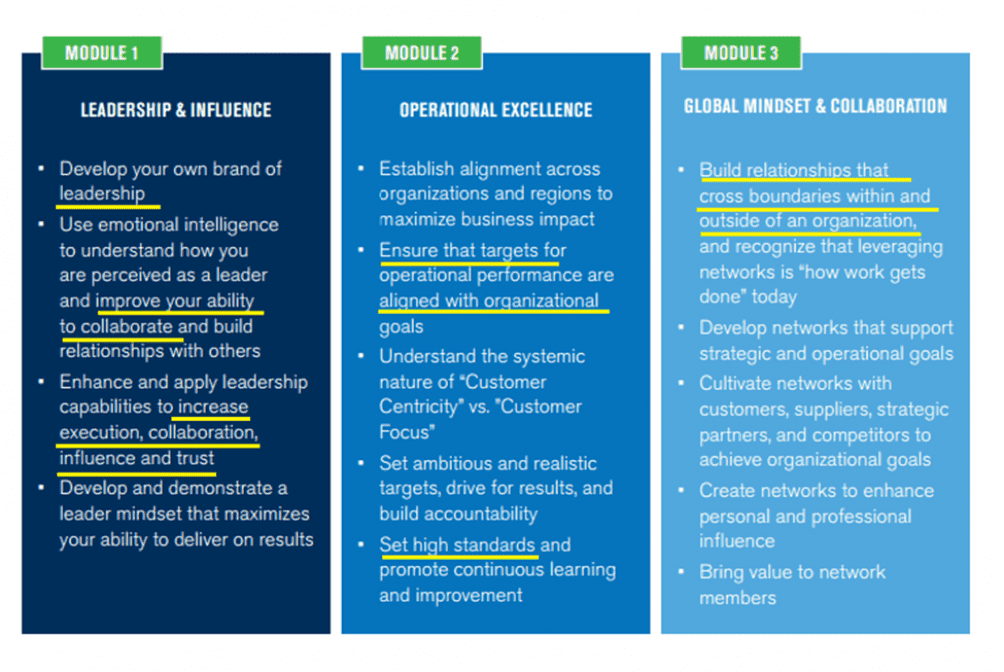
For example, a Google search for aviation leadership courses led to this training course from the International Air Transport Association (IATA) and Harvard Business Publishing.
Just compare the examples you find to the training you had in the military. What skills do both training courses have in common?
In the example above, leadership , collaboration , setting high standards, and building relationships are themes that match the following Airman Leadership School example.
You don’t have to write the description verbatim. Choose a couple of common keywords and summarize the course description.
Example from a military pilot’s resume:
Airman Leadership School (ALS), Community College of the Air Force 2012
A 5-week course designed to hone airmen into efficient front-line leaders. It develops the participants’ communication, leadership, and management skills while giving them a broader understanding of the military.
The Profession of Arms, International Security, and Warfare Studies courses were also included in the training but the candidate did not include them on their military resume to avoid drawing attention away from the leadership material.
Here’s another example showing education and training from a civilian resume with military experience highlighted for engineering:

Without a description, it’s easy to conclude that the candidate’s training doesn’t have other applications. Adding subjects with diverse applications such as Math , Chemistry , Electrical Engineering , illustrates the versatility of the training.
Highlight Your Security Clearances and Certifications
Security clearances, even for non-sensitive and not so top-secret access, show proof of your accountability and responsibility to employers.
A Top Secret (TS) clearance can cost thousands of dollars, so companies would rather look for someone who’s already undergone the background investigation and training required to get it.
Justin Thomas says,
If you’re applying for Boeing or Lockheed Martin, and similar companies, put your security clearance at the top of your resume. It helps recruiters decide whether they want to take a chance on you.
Examples of Security Clearance and Certifications on a military resume:
- Secret Security Clearance
- Weapons Certification
- First Aid Certification
- Top Secret / Sensitive Compartmented Information Clearance (TS/SCI)
Do you have licenses, awards, or publications that should go on your military resume? Do you know where to put them? Read our guide: What To Put On A Resume To Make It Perfect [Tips & Examples]
Be Cautious When Adding Active Combat Details
“Most frontline troops look into private security or law enforcement. In this case, combat experience is incredibly relevant,” says Allen.
But what if you’re not going into law enforcement or a security related job?
In that situation, adding details about your active combat experience is a bit of a coin toss.
Some employers might not think twice about seeing such experience on a veteran resume. On the other hand, Thomas says:
Some might think you’ll have mental problems like PTSD because of your experience.
Defending your country and its people is an admirable career.
The unfortunate reality is that many returning troops suffer from depression, PTSD, and other mental illnesses.
These ailments, while obviously not applicable to everyone with combat experience, may make some employers hesitate to hire you .
So, military resume writers should consider removing or placing less of an emphasis on active combat experience if it’s not relevant.
Don’t Forget to Write a Military to Civilian Cover Letter
Yes, you need a cover letter . Hiring managers often scan resumes for information to decide if you’re documents are relevant.
After, they’ll check your cover letter to get a fuller image of you. Don’t repeat what you’ve written on your military resume.
Instead, use your cover letter to complement the information you’ve provided.
Your cover letter is the place for providing explanations and fleshing out information you kept brief on your veteran resume.
Not sure how to write a military resume cover letter? Need advice on what to include? Read our guide: How to Write a Professional Cover Letter in 8 Simple Steps
Plus, a great cover letter that matches your resume will give you an advantage over other candidates. You can write it in our cover letter builder here. Here's what it may look like:

See more cover letter templates and start writing.
Key Takeaway
Let’s recap. To write a military resume that get's you a civilian job you have to:
- Choose a career path before putting your military experience on a resume.
- Translate your military skills, accomplishments, and work history into layman’s terms.
- Include relevant training and education.
- Emphasize your security clearances.
- Be careful about including information about active combat.
Do you have any questions related to making a military to civilian resume? Give us a shout in the comments section!
About Zety’s Editorial Process
This article has been reviewed by our editorial team to make sure it follows Zety's editorial guidelines . We’re committed to sharing our expertise and giving you trustworthy career advice tailored to your needs. High-quality content is what brings over 40 million readers to our site every year. But we don't stop there. Our team conducts original research to understand the job market better, and we pride ourselves on being quoted by top universities and prime media outlets from around the world.
- http://www.acinet.org/moc/default.aspx
- http://www.onetonline.org/crosswalk/MOC/
- https://www.iata.org/en/training/subject-areas/human-performance-courses/

Don't miss out on exclusive stories that will supercharge your career!
Get a weekly dose of inspiration delivered to your inbox
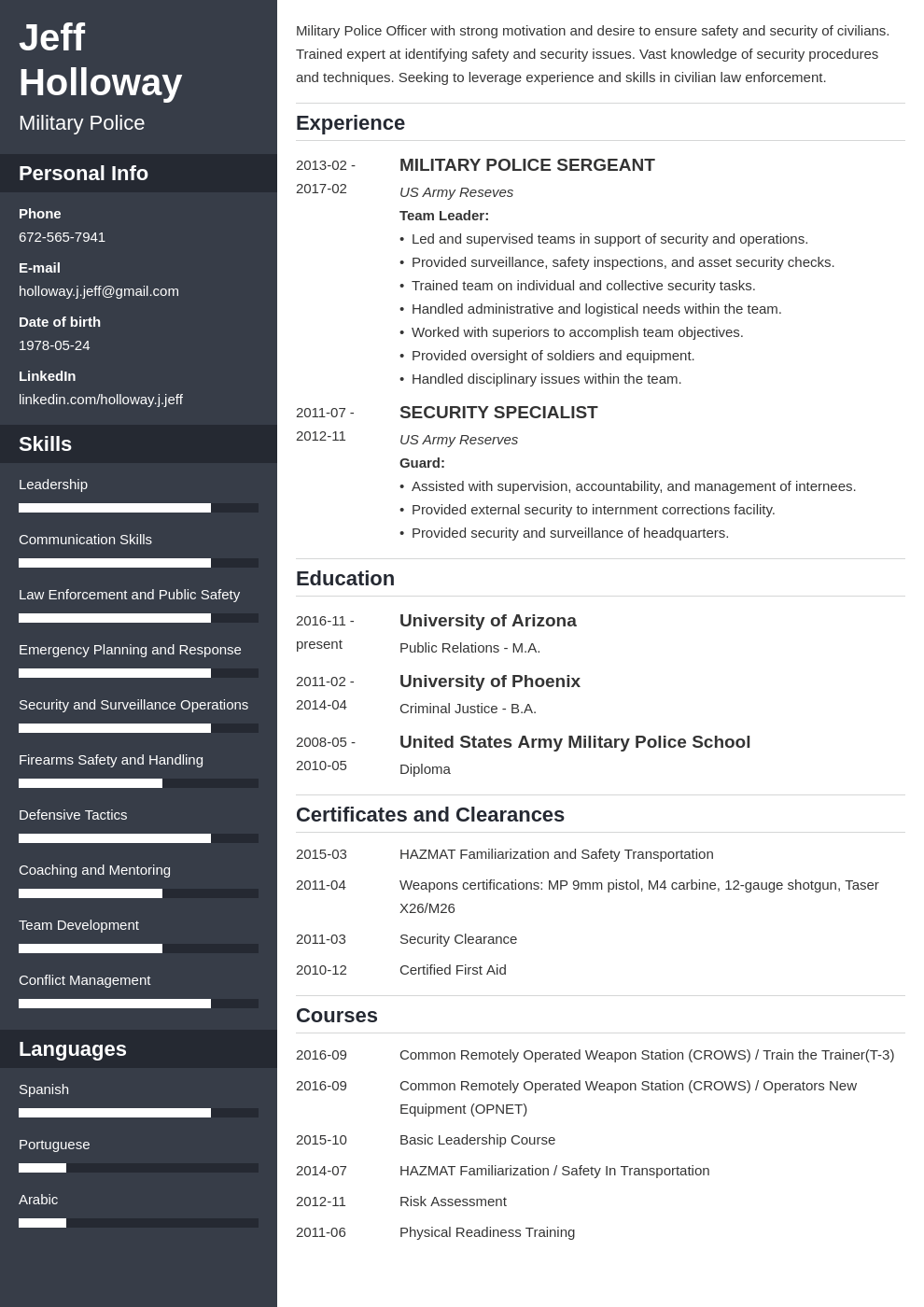
Similar articles
![building a military resume How to List Education on a Resume [+ Examples]](https://cdn-images.zety.com/pages/c881c66f-cfa7-480a-b5aa-eebddffef726.jpg?fit=crop&h=250&dpr=2)
How to List Education on a Resume [+ Examples]
What should go first in a resume: education or experience? How to put your education on a resume? And what an education section on a resume should look like? Time to learn.

Best Resume Format: Templates & Examples (2024)
How do you choose the best resume format to ensure your application stands out and helps secure an interview? I’ve gathered all the answers, great examples, and even more!

What Is a Functional Resume? Template, Examples, & Tips
You’re in the middle of a career change or have gaps in your employment. Show managers and coordinators how valuable your skills are with a great functional resume.
Military to Civilian Resume Example for Veterans [Updated 2024]

Transitioning from a military lifestyle to that of a civilian is far from easy.
According to a Pew Research Center study, 95% of veterans seek employment after serving in the military.
26% of veteran respondents, however, found shifting from the military to the civilian lifestyle to be somewhat difficult.
Coincidentally, one of the biggest struggles for veterans is creating a compelling military to civilian resume that’s going to help them get a job that’s well-paid and enjoyable.
To help solve that problem, though, we wrote this guide. Read on to learn everything you need to know to create a compelling veteran resume, including:
- Military to Civilian Resume Example
- How to Write a Military Veteran Resume (8 Simple Steps)
- Free Military to Civilian Resume Template
- Essential (Free) Job-Search Resources for Veterans
In case you’re looking to brush up on the resume basics, watch the video below.
If you’re ready to get started, though, let’s start by reviewing a well-written military to civilian resume example.
Military to Civilian Resume Example (for Veterans)

Compelling, right? Here’s what the above military to civilian resume example does right:
- Follows a functional resume format. The functional resume format focuses more on your skills and strengths rather than work experience. It helps convey how your military experience is going to help you perform well in the civilian role you’re applying for.
- Lists the contact information the right way. It includes the applicant’s full name, email, location, phone number, and even a LinkedIn URL while skipping out on a photo.
- Captures the hiring manager’s attention with a resume summary. The summary on top of the military to civilian resume example offers a brief snapshot of the candidate’s career, instantly showing the recruiter their value.
- Focuses on transferable skills instead of work experience. Instead of mentioning military buzzwords that civilians wouldn’t understand in the first place, the resume example instead focuses on how the candidate's experiences helped them develop valuable skills.
- Mentions achievements when possible. Achievements help convince the recruiter that they’re not just any candidate - you’re an overachiever who plays to win.
- Uses bullet points to make the resume easier to skim. The recruiter doesn’t have all day - they have hundreds of other resumes to review just for a single role. Making the resume easy to skim makes it more likely to be read.
- Includes educational history (in brief). The military to civilian resume example describes the candidate’s educational background, which includes taking a leadership course and basic training.
- Makes use of the optional sections. The achievements and interests sections help shed light on the candidate’s personality outside of work, as well.
Now, let’s talk about how YOU can make your resume as impressive as the example above.
How to Write a Military Veteran Resume (8 Easy Steps)
In this section, we’re going to walk you through the 8 steps to creating a powerful military veteran resume, starting with:
#1. Pick a Functional Resume Format
These are the 3 most popular resume formats out there:
- Reverse-chronological . This format focuses on your work history over education or skills.
- Functional . It focuses less on your work background and more on your skills and how they make you a qualified candidate.
- Combination . This format is a mix of the other two formats. It puts equal emphasis on skills and experiences.
As a military veteran, you’re better off with a functional format .

As you can see above, the resume example focuses more on key strengths instead of just listing out work experiences.
This improves your odds of landing a civilian job for one important reason:
Most recruiters aren’t really familiar with military lingo.
Your experiences in the military might be super compelling, but chances are, most recruiters won’t understand how these experiences make you a good candidate for the role.
By framing your experiences around your skills, on the other hand, your resume becomes more understandable for a civilian.
Once you’ve decided on the format, you also need to sort out your resume style, layout, font, and more. Here’s what this includes:
- Don’t go over one page . Your resume should be concise and to the point. More often than not, if you’re going over one page, you’re probably including information that isn’t relevant for the role.
- Pick the right font and font size . In terms of size, go for 11-12 pt for body text. For the font, pick something like Ubuntu, Times New Roman, etc. That way your resume will look professional AND stand out at the same time.
- Use the military-to-civilian resume template . Want to skip the hassle of formatting a resume? Hit the link and pick from one of our free templates! Our templates are easy to use AND look much more compelling than the conventional black-and-white ones.

#2. Include Contact Information
Now that we’ve got the formatting hassle out of the way, let’s talk about resume content.
The first thing in your veteran resume is the contact information section.
Here, you need to include:
- Descriptive title. This should include your title in the military, as well as the title you’re applying for. Something like “Security Officer Seeking a Role as Customer Support Specialist.”
- Phone number.
- Professional email address. Think, [name][lastname]@gmail.com
- Location. City and state are good enough, you don’t need to include an address.
- (Optional) LinkedIn URL. If you have an up-to-date LinkedIn profile, you can include a URL in the contact information section.
And finally, make sure NOT to include a photo in your military to civilian resume. In the US, employers prefer that you don’t include a picture to avoid unconscious bias during the hiring process.
Here’s what your resume contact information section should look like at the end:
Security & Customer Service Professional
416-821-9879
Seattle, US
linkedin.com/in/john.doe
#3. Capture the Hiring Manager’s Attention with a Military Veteran Resume Summary
When reading your resume for the first time, the recruiter will spend roughly 7 seconds skimming it to make sure that you’re qualified for the role.
If the resume catches their attention, they’ll give it a more in-depth look.
If it doesn’t, they’ll simply move on to the next one.
This is where a compelling resume summary can come in handy.
A resume summary is a 2-4 sentence “summary” of your past work experience. It helps the recruiter understand your skill-set and whether you’re relevant for the role in a single glance.
Here’s what a convincing military to civilian resume summary looks like:
Dedicated professional with over 9 years of outstanding performance and results in the U.S. Military. Earned three promotions and excelled as a leader. Seeking to apply the skills I gained in the military as a Customer Support Specialist at Company X.
When writing your resume summary, make sure to include the following information:
- Your title in the military and the role you’re applying for.
- Years of experience.
- Top achievements and experiences.

#4. Summarize Your Experiences with a Key Strengths Section
This one’s arguably the most important part of your military to civilian resume.
At the end of the day, the main deciding factor in whether you get invited for an interview or not is if your resume manages to convince the recruiter that you’re capable of doing the job…
And that’s where the key strengths section comes in handy.
To create yours, start by listing out your top strengths as section headers. Then, underneath each header, list your achievements and responsibilities that prove you actually have the relevant skill.
Here’s what this looks like on a resume:
Customer Service
- Promoted within a short period by demonstrating an over-achieving dedication that maximized results for the entire team.
- Proved internal customer service by relating to all personnel in a professional manner that facilitated the development of a diversified group.
- Enhanced soldiers’ individual and professional growth, developing them into independent decision-makers.
- Accounted for the safety of equipment valued at over $1.3 million.
- Secure the personal safety, training, and performance of fifteen U.S. Army soldiers.
Operations and Administration
- Organized schedules for over 45 soldiers.
- Implemented new routes, resulting in savings in gas time and reduced work time.
- Prevented over 10 cancellations and negotiated over 20 contract renewals with the local government.
Applying for a Military or Private Security Role? Do This
Now, in case you’re applying for a role that’s somewhat related to your experience in the military (e.g. in private security), then you can simply create a conventional Work Experience section instead of Key Strengths .
If that’s your case, here’s how you should format the section:
- Create a section header called “ Work Experience .”
- Start by listing your most recent role and go backward in time from there.
- For each entry, include your title, company name, dates employed, and 3-5 top achievements.
- For older positions, you can include fewer achievements and responsibilities.
Now, if you want your work experiences to stand out from the rest of the candidates, we recommend you to include achievements over responsibilities.
- Achieved a 99.5% average delivery rate on all assignments, resulting in no losses of materials or assets.
- Conducted deliveries of materials and assets.
The first example shows just how the candidate stands out from other applicants. The 2nd, on the other hand, does not.
#5. Mention Your Education (the Right Way)
On to the next section!
The next step to creating a convincing military to civilian resume is mentioning your educational background .
This is where you mention your higher educational degrees, as well as training (e.g. boot camps) and any personal development courses you’ve taken.
First things first, here’s how you’d go about the formatting part:
- Create a header called “Education”
- Add your latest degree right on top. Then, include older degrees underneath.
- If you have a B.A. or an M.A., you can skip your high school degree altogether.
- You can skip mentioning a GPA. These days, no one cares about your grades.
Here’s how the end result would look like:
B.A. in Communications Boston University 08/2016 - 05/2020
Now, if you don’t have the relevant experience needed for the role you’re applying for, you can use your education section to show off your knowledge or skills.
You can do this by including:
- Any honors you might have earned.
- Exact courses you’ve attended.
- Any other way you’ve excelled during your education.
#6. Include In-Demand Skills (For the Industry You’re Applying for)
Another must-have of a military to civilian resume is the skills section.
This is where you list out all of your hard and soft skills and (optionally) grade them by knowledge level.
The key here, though, is not to simply list out random skills like:
- Critical Thinking
- Microsoft Word
Rather, you want to include the skills relevant to the role .
E.g. applying for a role in accounting? You should probably mention payroll tax accounting, cost reduction strategies, budgeting and forecasting , and so on.
You wouldn’t want to mention your Adobe Illustrator skills, for example (even if you’re an expert at it).
So, how can you know which skills are essential to your resume, and which ones aren’t?
The best way to understand this is to read the job ad you’re applying for. More often than not, they include an exact list of skills required for the role, and all you have to do is mention them in your resume (as long as you possess the said skills, of course).
#7. Take Advantage of the Optional Resume Sections
If you still have some space on your military veteran resume, you can take advantage of some optional resume sections.
While these sections won’t land you the job on their own, they can definitely help you stand out from other applicants seeking the same role.
Some optional sections you can include are:
- Projects. Any type of personal project you’ve worked on. This can be a local business you started, a side-gig, freelance work, and so on.
- Certifications. Any type of certification you might possess. If you don’t have the experience for the role you’re applying for, certifications can help show the recruiter that what you do have is the right skill-set.
- Volunteering Experience. If you’ve volunteered in the past, you should definitely include it in your resume. Employers love candidates who love to help others (even if there’s no monetary incentive for it).
- Hobbies & Interests. Including hobbies or interests in your resume helps the recruiter see more of your personal side. While your hobbies won’t land you the job, they might help you build rapport with the interviewer.
#8. Make Sure Your Military to Civilian Cover Letter is as Impressive as Your Resume.
At this point, your military veteran resume should be quite compelling…
But you’re not done just yet!
To have both a complete and compelling job application, you need to pair your resume with a cover letter that’s just as good.
Here are our top tips on how to write a quality cover letter :
- Start the cover letter by addressing the hiring manager directly. Sure, you could go with the default “Dear Sir or Madam,” but mentioning the hiring manager’s name shows that you’ve done your research and really care about working at the company.
- In your introduction, mention the most important parts of your background. E.g. years of experience, key achievements, top skills, and why you’re applying for the job in question.
- In the body section of your cover letter, expand on whatever you mentioned in the introduction. This is where you can also explain how the experiences mentioned in your resume make you a good candidate for the role.
- Conclude the cover letter with a call to action . E.g. “Looking forward to hearing more from you!” or “I’d love to discuss how I can help Company X as a Support Specialist over a call or an interview.”
Want to learn more? Check out our step-by-step guide on how to write a cover letter .
Essential Job-Search Resources for Veterans
There are a lot of free job-search resources for veterans on the internet - everything from dedicated job boards to free tools, programs, and more.
Here’s a comprehensive list of some of the very best resources:
Veteran Job-Search Resources
- Job board that helps you find federal organizations that prioritize hiring veterans over other candidates.
- Lots of quality resources to help you transition into civilian life.
- If you’re not sure what kind of career you want to focus on, you can use this website to discover different occupations and learn what they’re about.
- Website for finding veteran job fairs in your area.
- Free career consulting and job search help for veterans.
- American Corporate Partners matches you with a free, year-long mentor to help you build your career.
- LinkedIn offers its Premium program to veterans for free for a year. You can use the platform to learn new skills, kick-start your career, as well as find and apply for jobs.
- A website dedicated to helping veterans transition into a civilian lifestyle. You can use it to find jobs, discover career events, attend job fairs, and more.
- Job board for US federal jobs. While it’s not specifically made for veterans, the US government prioritizes hiring veterans over other candidates.
- Job board for veteran-friendly roles and companies.
- Job board for roles in the private security industry.
- Another veteran-only job board.
Key Takeaways
And that’s all you need to know to create a strong military veteran resume!
Before you go, though, let’s do a quick recap of the key learning points we just covered:
- For a military to civilian resume, use a functional resume format to show off your skills instead of work history.
- Use a “Key Strengths” section to explain how your military experience distills into valuable skills for a civilian role.
- Don’t include every skill under the sun on your resume. Instead, pick the ones relevant for the role you’re applying for.
- Take advantage of the optional resume sections to show the recruiter that you’re an individual and not just a resume.
- Finally, make sure that your cover letter is just as impressive as your resume by following the tips we mentioned above.

To provide a safer experience, the best content and great communication, we use cookies. Learn how we use them for non-authenticated users.

- Back to Menu
- Military Basics Overview
- New to the Military
- Advancing in the Military
- Logistics for Service Members
- Wounded, Ill or Injured & Their Caregivers
- Deployment Overview
- Preparing for Deployment
- During Deployment
- Returning Home From Deployment
- Transitioning & Retiring Overview
- Military Separation
- Transitioning to Civilian Life
- Joining the Guard & Reserves
- Casualty Assistance Overview
- Support After Loss
- Understanding Grief
- Survivor Finances & Legal
- Making the Final Move
- Moving & PCS Overview
- Preparing to Move
- Moving Your Personal Property
- Settling in After Moving
- OCONUS/Overseas Moves
- Housing & Living Overview
- On-Base Housing
- Off-Base Housing
- Making the Most of Your Installation
- Living Overseas
- Disaster Preparedness
- Recreation, Travel & Shopping Overview
- MWR, Recreation, Fitness & Libraries
- Travel & Lodging
- Commissary & Exchange
- Relationships Overview
- Friendships & Single Life
- Support Community
- Married Life & Domestic Partnerships
- Separation & Divorce
- Parenting Overview
- New Parents
- Adoption & Foster Care
- Children, Youth & Teens
- Child Care Programs
- Preventing Harmful Behaviors
- Military Family Life
- Special Needs Overview
- EFMP — Exceptional Family Member Program
- Support for Families With Special Needs
- Medical Needs
- Educational Needs
- Health & Wellness Overview
- Prevention & Care
- Mental Health
- Nutrition & Fitness
- Substance Abuse
- Safety From Violence & Abuse Overview
- Unhealthy Relationships
- Domestic Abuse
- Child Abuse
- Financial & Legal Overview
- Personal Finance
- Education & Employment Overview
- For Spouses
- For Service Members
- For Youth & Teens
- Service Member
- New Service Member
- Transitioning Service Member
- National Guard Member
- Wounded Warrior
- Retiree/Veteran
- Family With Special Needs
- Service Provider or Leader
- Extended Family or Friend
- View Benefits Finder
- Military OneSource Services
- Planning & Prevention
- Discounts & Perks
- Pay & Leave
- Education & Employment
- Family & Child Care
- Relationships
- Health Care & Emotional Well-being
- Assistance Programs
- Popular Benefits
- Space-A Travel
- DOD MWR Libraries
- View Resources Finder
- MilLife Guides
- Military OneSource Network Websites
- Government Websites
- External Websites
- Directories & Tools
- Online Learning
- Mobile Apps
- Popular Resources
- MilitaryINSTALLATIONS
- Plan My Move
- Moving Personal Property
- Other Resources
- Data, Research & Statistics
- View Products Finder
- Popular Product Types
- Book/Booklets
- Fact Sheets
- Educational Items
- Popular Products
- MilTax Fact Sheet
- Preparing for Your Move Fact Sheet
- Military and Family Life Counseling Brochure
- Benefits of Commissaries Fact Sheet
- Spouse Ambassador Network Fact Sheet
- Start at the Table Book
- Non-medical Counseling
- Military OneSource Non‑medical Counseling
- Military and Family Life Counseling
- Specialty Consultations
- Building Healthy Relationships
- Health & Wellness Coaching
- New MilParent
- Peer-to-Peer
- Special Needs
- Spouse Relocation & Transition
- Transitioning Veterans
- Interactive Tools & Services
- Financial Counseling
- MilTax: Free Tax Services
- Language Services
- Caregiver Support Services
- Spouse Education and Career Opportunities
- Resilience Tools
- My Military OneSource App
- Chill Drills App
- Domestic Abuse Victim Advocate Locator
- Relationship Resource Tool
24/7/365 Access to Support
No matter where you serve or live, free and confidential help is available.
- 800-342-9647
- Call Us OCONUS
- Call Us TTY/TDD
- Veterans/Military Crisis Line
Dial 988 then press 1 or text 838255
Chat with a VA responder
Call from OCONUS
www.veteranscrisisline.net
- National Domestic Violence Hotline
Call 800-799-SAFE (7233)
Chat live now
Text “START” to 88788
- DOD Safe Helpline - Sexual Assault Support
Call 877-995-5247
www.safehelpline.org
- 988 Suicide & Crisis Lifeline
Chat with a crisis responder
Use your preferred relay service, or dial 711 then 988
- Domestic Abuse Victim Advocate Locator - Family Advocacy Program
Find an advocate.
In the United States, call 911 if you are in an emergency.
For those outside the United States, call your local emergency number.
- Casualty & Mortuary Affairs
- Child & Youth Advocacy
- Children, Youth & Family Programs
- Commissary, Military Exchange & Lodging
- Family Advocacy Program
- Military Community Support Programs
- Military & Family Life Counseling
- Military Funeral Honors
- Morale, Welfare & Recreation (MWR)
- Office of Special Needs
- Personnel Accountability & Evacuations Operations
- Spouse Education & Career Opportunities
Contact Military OneSource
Information and support for service members and their families. About the Call Center .
- Additional Ways to Contact Us

Directories & Tools
Myseco resume builder, about the resume builder.
Are you preparing to apply for a new job and need assistance? Learn how the MySECO Resume Builder along with additional SECO resources and personalized support put you in the driver’s seat to create a resume that best describes your unique skills and qualifications.
Craft the perfect resume with the MySECO Resume Builder available through the MySECO website.
View the Steps
Other MySECO Services
Be sure to visit the Military Spouse Employment Partnership Job Search to view job opportunities with employers that have committed to recruit, hire, promote and retain military spouses. You can search by job title or keyword as well as industry, company name or job type.
You can also contact a career coach to assist you at any time by calling Military OneSource at 800-342-9647 or using the Live Chat feature on MySECO.
Learn about military bases worldwide. Get installation overviews, check-in procedures, housing, neighborhood information, contacts for programs and services, photos and more.
Find an Installation
View All Installations
Click "Extend" below to stay logged in.
If you are part of the general public, navigate to the public site. This site is solely for testing and approving site pages before they are released to the general public.
Military Resume: Examples and Writing Tips for 2024

Are you a military veteran looking to transition into the civilian job market? If so, you’re not alone. The transition can be challenging, and crafting a compelling resume is a crucial first step. This article aims to guide veterans in writing an effective military resume that highlights their skills, experience, and achievements.
Importance of a Military Resume
A military resume is essential for veterans seeking employment outside of the military. Unlike a standard resume, a military resume is structured differently and emphasizes skills and accomplishments that translate to civilian job roles. A well-crafted resume can make a significant impact in getting an interview and ultimately landing a job.
Differences Between Military and Civilian Resumes
Military resumes differ from civilian resumes in several ways. Military resumes use terminology and acronyms that may be unfamiliar to civilian hiring managers. They also include information about military-specific training, experience, and accomplishments. A civilian recruiter may not understand the significance of certain military achievements, so it’s crucial to translate the military experience into civilian language.
Overview of the Article Sections
This article will provide examples and writing tips for crafting a successful military resume. The following sections will cover:
- Formatting and structure of a military resume
- Translating military experience and achievements into civilian language
- Highlighting relevant skills and accomplishments
- Including relevant education and certifications
- Tips for tailoring the resume to specific job applications
By the end of this article, readers should have a comprehensive understanding of how to create an effective military resume that will help them transition into a civilian career.
Understanding the Military Resume Format
Military resume sections and heading.
When it comes to writing a military resume, it’s important to understand the different sections and headings that are typically included. The format of a military resume is slightly different from a civilian resume, with more emphasis placed on skills and duties over work experience.

The main sections you should include in your military resume are:
- Contact information
- Summary statement or objective
- Education and training
- Military experience
- Relevant skills and certifications
- Awards and honors
- Professional references
Be sure to use a clear and easy-to-read font and keep your formatting consistent throughout the document.
Identifying Relevant Military Skills and Duties
One of the key challenges when writing a military resume is identifying the most relevant skills and duties to include. This is especially important if you’re transitioning from the military to a civilian career, as you’ll need to show how your military experience translates into relevant skills for the job you’re applying for.
To do this effectively, start by reviewing the job description and identifying the key skills and qualifications they’re looking for. Then, look for examples from your military experience that demonstrate those same skills and use them as bullet points under your relevant military experience section.
When describing your military duties, focus on the transferable skills you gained that are relevant to the job you’re applying for. For example, if you were in the infantry, you might highlight your leadership and teamwork skills, your ability to work under pressure, and your attention to detail.
Importance of Using Keywords and Action Verbs
Finally, it’s important to use keywords and action verbs throughout your military resume to help it stand out to potential employers. Keywords are the specific skills and qualifications listed in the job posting, while action verbs are strong, active words that show what you accomplished in your previous roles.
Some examples of effective action verbs for a military resume include:
- Implemented
By using these words and phrases, you can show employers that you have the skills and experience they’re looking for and help your military resume make it past the initial screening process.
When writing a military resume, it’s important to understand the different sections and headings, identify your most relevant skills and duties, and use keywords and action verbs throughout to make a strong impression on potential employers.
Tips to Make Your Military Resume Stand Out
Creating a military resume that stands out can be challenging, but with the right guidance, it is achievable. As a copywriter and subject matter expert with years of experience, I’ve distilled some tips that will help veterans transition successfully into civilian life.
Tailoring a Resume to a Specific Position
The first step in crafting a resume that stands out is tailoring it to the specific position. Job descriptions are the starting point. Use the language and keywords that appear in the job posting to demonstrate that you have the necessary skills and experience. Highlight your military work experience and other accomplishments that demonstrate your capabilities and qualifications for the job.
Remember that while your military experience is important, your resume should primarily focus on your transferable skills.

Highlighting Transferable Skills
Many veterans underestimate the value of the skills they’ve developed during their military service. These skills include leadership, teamwork, problem-solving, and adaptability. Highlighting these transferable skills is crucial when transitioning into civilian work. Employers place a premium on these skills, regardless of the industry or position.
Make sure your resume reflects your transferable skills by providing examples of how you applied them in your military roles. Quantify results wherever possible. For instance, if you helped reduce downtime in a mission-critical communications system or achieved a 100% success rate during range training, be sure to mention it in your resume.
Including Accomplishments and Achievements
Including your military accomplishments and achievements is essential in making your resume stand out. These accomplishments can demonstrate your strength, leadership, and expertise. Certificates of training, decorations, awards, and other official recognitions should be included in your resume. Highlight any leadership roles you held, as well as any missions or operations you participated in.
Avoiding Military Jargon
When creating a military resume, it is essential to avoid using military jargon. Although military jargon may be familiar to you, it might not be intelligible to civilian hiring managers. Instead, use plain language that is easy to understand. Also, avoid acronyms or abbreviations if possible, or clearly explain what they mean.
Consider these tips when drafting your military resume, and tailor your resume to the specific position. Highlight your transferable skills, showcase your achievements, and avoid using military jargon. Doing so will help you get noticed by hiring managers and increase your chances of landing a civilian job.
Military Resume Examples for Different Branches
When it comes to crafting a military resume, it’s important to highlight the unique experiences and skills that come with serving in a specific branch of the armed forces. Here are examples of military resumes tailored to the Army, Navy, Air Force, Marine Corps, and Coast Guard, to help guide your own resume writing process.
Army Resume Example
Name: John Doe Rank: Staff Sergeant Years of Service: 8 years Occupational Specialty: Infantry
Summary: Highly motivated Infantry Staff Sergeant with eight years of experience in combat operations, tactical planning, and leadership. Decorated with the Army Commendation Medal and the Combat Infantry Badge. Proven ability to lead soldiers in high-stress situations and achieve mission objectives.
Key Skills:
- Tactical Planning
- Combat Operations
- Team Leadership
- Weapons Proficiency
- Risk Management
Experience:
- Led 12-soldier infantry team on multiple combat patrols and security operations in Afghanistan
- Supervised and trained platoon of 40 soldiers in marksmanship and combat skills
- Coordinated and executed training exercises with other military branches and foreign armies
- Conducted risk assessments and implemented safety protocols for training exercises and operations
Navy Resume Example
Name: Jane Smith Rank: Petty Officer First Class Years of Service: 10 years Occupational Specialty: Cryptologic Technician
Summary: Dedicated Cryptologic Technician Petty Officer First Class with 10 years of experience in signal intelligence analysis and data collection. Proven track record of supporting national security missions and delivering critical intel to senior leadership. Holds an active TS/SCI security clearance.
- Signal Intelligence Analysis
- Communications Security
- Data Collection and Analysis
- Cryptography
- Security Clearance Management
- Analyzed and reported critical intelligence to senior leadership during three deployments in support of national security objectives
- Managed and secured classified information and communication systems
- Trained and mentored junior personnel in signal intelligence and security procedures
- Collaborated with interagency partners to share intel and coordinate operations
Air Force Resume Example
Name: Robert Johnson Rank: Technical Sergeant Years of Service: 12 years Occupational Specialty: Aircraft Maintenance
Summary: Highly skilled Aerospace Maintenance Technician with 12 years of experience in aircraft maintenance and repair. Demonstrated expertise in troubleshooting, inspecting, and maintaining various aircraft systems. Committed to upholding the highest standards of safety and professionalism. Proven ability to work efficiently in fast-paced and high-pressure environments.
Aircraft Maintenance Troubleshooting Technical Inspections Team Collaboration Safety Compliance
- Performed scheduled and unscheduled maintenance on F-16 fighter aircraft, ensuring operational readiness
- Conducted detailed inspections of aircraft components, identifying and resolving mechanical issues
- Collaborated with a team of technicians to troubleshoot complex electrical and avionics systems
- Assisted in aircraft launch and recovery operations, adhering to strict safety protocols
- Maintained accurate maintenance records and documentation in accordance with Air Force regulations
Civilian Transitions: Examples and Tips
Civilian transition resume example.
As a veteran transitioning to civilian life, it’s important to have a strong, relevant resume that will catch the attention of potential employers. Here’s a sample civilian transition resume to help guide you:
Civilian Transition
Highly motivated and disciplined military veteran with a successful track record of leadership and operational excellence. Transitioning from a distinguished career in the military to a civilian role. Strong problem-solving skills, adaptability, and a commitment to teamwork. Seeking a challenging position that allows for the application of transferable skills in a civilian setting.
Operations Manager
XYZ Military Base October 2012 – Present
- Led a team of 50 personnel in planning, coordinating, and executing operational missions in high-pressure environments.
- Managed logistics and resources to ensure mission success and adherence to strict timelines.
- Developed and implemented standard operating procedures (SOPs) to optimize efficiency and enhance performance.
- Conducted risk assessments and implemented safety protocols to maintain a safe working environment.
- Collaborated with cross-functional teams to achieve mission objectives and maintain effective communication channels.
Training and Development Officer
ABC Military Training Center January 2009 – September 2012
- Designed and delivered comprehensive training programs for military personnel, focusing on leadership development, team building, and technical skills.
- Conducted needs assessments and identified training gaps to create tailored training solutions.
- Evaluated training effectiveness and made necessary adjustments to meet performance objectives.
- Provided mentoring and guidance to junior officers and enlisted personnel, fostering professional growth and development.
- Managed training resources, including facilities, equipment, and instructional materials.
- Bachelor of Science in Business Administration University of XYZ Graduated: May 2008
- Leadership and team management
- Strategic planning and problem-solving
- Effective communication and interpersonal skills
- Project management and organizational abilities
- Adaptable and resilient in fast-paced environments
Certifications
- Project Management Professional (PMP) Certification
- Six Sigma Green Belt Certification
- Hazardous Materials Handling Certification
Volunteer Experience
Community Outreach Volunteer
Local Veterans Organization January 2010 – Present
- Engaged in community outreach programs to support and assist fellow veterans in their transition to civilian life.
- Provided mentorship and guidance to veterans seeking employment and educational opportunities.
- Organized and participated in fundraising events to support local veterans’ initiatives.
Professional Affiliations
- Member, Veterans of Foreign Wars (VFW)
- Member, Military Officers Association of America (MOAA)
Available upon request
Military Spouses: Resume Tips and Examples
As a military spouse, it can be tough to build and maintain a career due to the frequent relocations and unpredictability of military life. However, with the right resume and job search strategies, military spouses can successfully navigate the challenges and seize opportunities that come their way.
Challenges and Opportunities of Military Spouses
One of the biggest hurdles military spouses face is a lack of continuity in employment due to frequent moves. This results in gaps in the resume and difficulty in building a consistent career trajectory. Additionally, military spouses may find it challenging to explain their work history and educational qualifications to civilian employers, who may not understand the unique circumstances of military life.
However, military spouses also possess a wealth of transferable skills and experiences that can be leveraged to their advantage, such as adaptability, resilience, and cultural awareness. They may have experience in diverse industries, exposure to people from different backgrounds, and demonstrated ability to work effectively in high-stress environments. These qualities make them valuable assets in today’s globalized world.
Military Spouse Resume Example
A military spouse resume should highlight key skills and experiences that are relevant to the target job or industry. It should also address any gaps in employment and explain the rationale behind them. For example:
Sarah Thompson
Military Spouse
Dedicated and adaptable military spouse with a strong work ethic and excellent organizational skills. Experienced in managing various responsibilities while accommodating the demands of a military lifestyle. Proven ability to quickly adapt to new environments and work effectively within a team. Seeking a position that offers flexibility and allows for continued professional growth.
Administrative Assistant
ABC Company March 2018 – Present
- Provide comprehensive administrative support to the executive team, including calendar management, meeting coordination, and travel arrangements.
- Prepare and edit correspondence, reports, and presentations using Microsoft Office Suite.
- Maintain confidential records and databases, ensuring accuracy and compliance with company policies.
- Act as a liaison between departments, facilitating communication and streamlining workflow.
- Assist in organizing company events and employee engagement initiatives.
Customer Service Representative
XYZ Corporation June 2015 – February 2018
- Responded to customer inquiries and resolved issues promptly and professionally.
- Managed a high volume of incoming calls and emails, ensuring a high level of customer satisfaction.
- Handled customer complaints and worked towards effective resolutions.
- Assisted in maintaining customer databases and updating customer records.
- Collaborated with team members to improve customer service processes and enhance the overall customer experience.
- Bachelor of Arts in Business Administration University of XYZ Graduated: May 2014
- Strong organizational and time management abilities
- Excellent verbal and written communication skills
- Proficient in Microsoft Office Suite
- Customer service-oriented mindset
- Ability to work independently and as part of a team
Family Readiness Group Volunteer
ABC Military Base June 2017 – Present
- Assisted in organizing and coordinating events to support military families during deployments and separations.
- Provided information and resources to military families, promoting a sense of community and support.
- Facilitated communication between military families and base personnel, addressing concerns and providing assistance when needed.
- Certified Administrative Professional (CAP)
- Customer Service Excellence Certification
- Member, Military Spouse Employment Partnership (MSEP)
- Member, National Military Family Association (NMFA)
Writing Tips from Veteran Experts
Here are some insights and recommendations from veteran experts to help transitioning military personnel land their dream jobs.
Benefits and Challenges of Hiring Veterans
Hiring veterans brings numerous benefits to organizations, such as their exceptional leadership, teamwork, and problem-solving skills. Vets are quick learners who can adapt to new environments and take on responsibilities with minimal supervision. They have a strong work ethic and can excel in high-stress situations. However, transitioning military personnel may face some challenges when entering the civilian job market. Some of these include translating their military experience into civilian terms, learning new communication styles, and adjusting to the differences in job expectations.
Insights and Recommendations from Veteran Experts
To overcome these challenges, veteran experts recommend seeking mentorship from other veterans, networking with industry professionals, and familiarizing yourself with the latest industry trends. It is also important to highlight your military experience on your resume and translate your skills and achievements into civilian terms. When applying for jobs, tailor your resume and cover letter to the job requirements and research the company culture to demonstrate your fit.
Do’s and Don’ts for Military Job Seekers
Here are some essential do’s and don’ts for military job seekers:
- Highlight your unique military experience and skills on your resume
- Translate military jargon into civilian language
- Emphasize specific achievements and accomplishments
- Show your flexibility and ability to adapt to new environments
- Customize your resume and cover letter to each job application
- Network with professionals in your desired field
- Use military jargon or acronyms that civilian employers may not understand
- Overemphasize rank or positions held in the military
- Assume that civilian employers understand what the military does or how it operates
- Rush the job application process and fail to research the company culture
- Ignore the importance of networking and building professional relationships
By following these tips and recommendations, military job seekers can create effective resumes that highlight their unique skills and experience, increase their chances of landing their dream job, and successfully transition to the civilian workforce.
Military Resume Checklist and Common Mistakes
When it comes to writing a military resume, there are certain “must-haves” that recruiters and hiring managers are looking for. Here are some essential components of a strong military resume:
- Clear and concise summary statement: Your summary statement should clearly state your experience and skills, and make it clear that you are a strong candidate for the job.
- Quantifiable achievements: Use specific numbers and figures to demonstrate your accomplishments and impact in your military career.
- Relevant skills and experience: If you’re applying for a civilian job, make sure to focus on the skills and experience that are most relevant to the position.
- Education and training: Highlight any relevant degrees or certifications you’ve earned, as well as any training or professional development courses you’ve completed.
But it’s not just about including the right information – there are also common mistakes that many job seekers make on their military resumes. Here are a few of the most common mistakes to avoid:
- Focusing too much on military jargon: While it’s important to highlight your military experience, it’s also important to make sure that a civilian employer will be able to understand what you did and how it translates to the job you’re applying for.
- Including irrelevant information: While it’s great to be well-rounded, including information that isn’t relevant to the job you’re applying for can actually hurt your chances of getting hired.
- Not tailoring your resume to the job: Every job is different, and your resume should reflect that. Make sure to customize your resume for each job you apply for.
- Formatting and spelling errors: Even the best content can be overshadowed by poor formatting and spelling mistakes. Make sure to proofread your resume carefully, or have someone else look it over for you.
So how can you make sure your military resume is error-free and ready to impress potential employers? Here are a few proofreading and editing tips:
- Read it out loud: This can help you catch mistakes that you might miss when reading silently.
- Use a spellchecker: While spellcheckers can’t catch everything, they can help identify some common errors.
- Get a second opinion: Having someone else look over your resume can help you identify mistakes you may have missed.
- Take a break: Once you’ve finished writing your resume, give yourself some time (ideally a day or two) before coming back to it with fresh eyes. This can help you catch mistakes you may have overlooked before.
By following these military resume checklist items and avoiding common mistakes, you can create a strong, impressive resume that will help you stand out to potential employers.
Cover Letters for Military Resumes
A compelling cover letter can be the difference between your military resume being considered for a job or falling to the bottom of the pile. Here we will discuss the importance of a cover letter and provide tips for writing one that catches the attention of the hiring manager.
Importance of a Cover Letter
A cover letter is an opportunity to showcase your personality, highlight your strengths and experience, and provide specific examples of why you are the best candidate for the job. It’s a chance to explain any gaps in your military service or aspects of your experience that may not be easily understood from your resume alone.
A well-written cover letter can also demonstrate your communication skills and ability to convey important information in a concise and professional manner. It shows that you are taking the time and effort to tailor your application to the specific job and employer.
Tips for Writing a Compelling Cover Letter
- Address the letter to a specific person whenever possible
- Open with a strong and attention-grabbing statement or question
- Tailor the letter to the specific job and employer, highlighting how your skills and experience align with their needs
- Use specific examples to illustrate your skills and experience
- Keep it concise and professional, ideally one page or less
- Close with a strong call to action, requesting an interview or further discussions
Remember, your cover letter should complement your resume, not repeat it. It’s an opportunity to add additional context and information to your application.
Cover Letter Example
Dear [Hiring Manager’s Name],
I am writing to express my strong interest in the [Job Title] position at [Company Name]. As a decorated [Rank/Branch] with [X] years of experience in the [Military Branch], I am confident that my [Skill/Experience] make me an ideal candidate for this role.
My experience leading [X] teams on high-pressure missions has honed my ability to quickly and effectively adapt to changing situations. For example, during my deployment to [Location], I led a team of [X] personnel in ensuring the successful completion of numerous [Mission Objective] despite the challenging terrain and hostile environment.
At [Current/Previous Employer], I utilized my [Skill/Experience] to [Accomplishment] which resulted in [Outcome/Impact]. I am confident that these skills will allow me to excel in the [Job Title] position at [Company Name].
Thank you for your time and consideration of my application. I look forward to the opportunity to discuss further how my skills and experience can contribute to the success of [Company Name].
Related Articles
- 10 Accountant Resume Examples That Secured Jobs in 2023
- Videographer Job Description: Career Guide for 2023
- Plumbing Apprentice Resume: Winning Examples for 2023
- Including References on Your Resume: Formatting Examples
- Manufacturing Production Resume: Winning Examples
Rate this article
0 / 5. Reviews: 0

More from ResumeHead

How to Build a Military to Civilian Resume [+ Tips & Examples]

Are you an ex-military member seeking a job, but any responses to your resume are AWOL? Does it feel like you are fighting a losing battle when it comes to landing a civilian job?
Using military to civilian resume examples , we’ll clarify how you as an ex-service member can generate the type of army to civilian resume that will wow hiring managers while still providing details about what you did while serving.
In addition, there’s always our templates and resume examples that can help guide you as you build your professional document.
Table of content:
Finding a Civilian Job After Your Military Experience
You would think that someone who served in the military might be a shoo-in for many jobs, as those who served are undoubtedly disciplined and possess a strong work ethic.
Well, a lack of responses to a veteran resume could be because in many cases, a military background does not translate well into the civilian world.
In other words, an army resume detailing your military service might not look or sound quite like the work history or experience section of a civilian resume.
A story that fully illustrates the difference between civilian and military terms:
After leaving military life, an Army sergeant decides to pursue a career in project management . During an interview, he is at a loss when asked to describe a time he managed a project. His reply: in the military, he only managed missions, not projects.
However, his experience in managing missions could easily be translated into managing projects, as it is likely he utilized team management, scheduling, time management , communication, problem-solving, and risk management skills when leading missions—all skills needed in project management!
So, you’ll need to make sure that you’ve successfully created a military to civilian resume that can relate your duties in the service while showing that you can handle the responsibilities of a civilian job… and to do so using civilian rather than military terms.
For example, you might have assumed a wide range of MP duties. However, for a hiring manager unfamiliar with MP standing for Military Police, simply stating that you handled MP duties will not be informative and could even be confusing.
Better to provide details: you “performed patrol duties; conducted criminal investigations; carried out search and seizures; led traffic stops; oversaw suspect interviewing; and responded to traffic accidents.”
Let’s start with some specific tips and examples to create your civilian resume.
Decommission the Military Jargon
While you may be used to referring to yourself as an MSgt E-8 or a CWO4 in the Marines, that will basically mean nothing to a hiring manager in the civilian world.
It will help to spell it out: Master Sergeant or Chief Warrant Officer 4. Then, detail your duties following your job title.
When possible, change your military title to a more civilian-friendly title for a successful military transition resume. You might have been a “Non-Commissioned Officer (NCO)” or “Senior NCO” in your military life, but it’ll be a lot more effective to let civilian recruiters know that you were a “Supervisor.”
Some military veteran resume examples of military titles translated into civilian terms include:
88H Cargo Specialist – Distribution Manager
Supply Sergeant – Logistics or Supply Manager
Force Squad Leader – Team Leader
Commander – Senior Manager
Undoubtedly, as a commander you gave orders to and directed personnel, while your duties as a supply sergeant led you to tracking inventory and ordering needed supplies.
These are details that a civilian hiring manager will relate to, so be sure to spell it out in terms that make sense to them.
So, you didn’t “deploy troops”, you coordinated teams; you didn’t “distribute tactical equipment”, you ordered requested supplies; you didn’t “perform reconnaissance”, you “collected data.”
Designations such as E-8 simply reflect pay grade and only have meaning within a military organization. You can leave such information off your civilian resume.
Listing your Military Experience on a Civilian Resume
Ready to take a look at what might and might not work on a military to civilian resume?
We’ll focus on military experience for this example.
How should you best list your military experience on a civilian resume? Not like that:
Field Artillery Officer U.S. Army September 2020 – October 2022
- Performed repairs and maintenance on AAM, AAA, ABM, and ASM.
- Specialized in BM and CM systems.
- Oversaw team responsible for CRBM.
Your service is, of course, truly appreciated, and we salute you for being a member of the United States Armed Forces.
However, we honestly do not have any idea what you did while you served based on this entry, and most likely any hiring manager will not have any idea, either.
So, your experience should look like this:
- Operated, maintained, and repaired various types of missile systems.
- Controlled placement of field artillery equipment.
- Directed operation of fire control communications systems.
- Managed field artillery operations post.
- Led a team of 15 artillerymen.
- Coordinated new equipment placement.
- Trained subordinates in logistics operations and radio procedures.
In this example, you clearly demonstrate your management, coordination, training, teamwork, and mechanical skills—all abilities generally sought for civilian positions and that could attract a recruiter or hiring manager much more than a string of acronyms they simply will not understand.
Another example: say you worked as an Aircraft Maintenance Technician for the military. You would not say:
Aircraft Maintenance Technician U.S. Air Force June 2019 – July 2021
- Serviced and maintained HC130J, HC-144, MH-60T, and the MH-65E.
- Documented inspection and maintenance processes in FERMS and IMDS.
- Completed all maintenance and repairs in accordance with AFI 21-101 standards.
Again, a little too much military lingo!
Instead, you might try:
- Serviced and maintained fleet of USAF aircraft.
- Maintained inspection and maintenance records in required systems.
- Ensured all maintenance and repairs were conducted according to established standards.
In the latter, you show to be versatile, compliant, and meticulous , without any of the confusing jargon that would likely put off any recruiter.
It doesn’t take much to make the change on a military to civilian resume!
Simply be cognizant of the acronyms and terms you grew accustomed to while in the military, and understand that those who never served will not be familiar with things that are common to you.
Accomplishments on a Resume for Veterans
As with a civilian resume, it’s important and helpful to note any accomplishments and awards on a military transition resume.
Just as professional successes and accomplishments should be listed on a civilian resume, so too should these be noted on a military to civilian resume.
Were you awarded an Expert Marksman award? A Good Conduct Medal? Combat Action Badge?
These should definitely be listed on your military to civilian resume. By acknowledging these, you will show yourself to be hard-working, dedicated, focused, and attentive to detail.
It’s also effective to identify any accomplishments that are easily transferrable to civilian work-life.
For example, you might have overseen a team responsible for maintaining aircraft for the U.S. Air Force that consistently led to a decrease in repairs. Add this fact! This shows you can be all you can be when it comes to teamwork and leadership.
Avoid listing extensive combat details on your resume if possible, as some might view those who were involved in combat situations to possibly suffer some effects such as PTSD or depression.
It’s also recommended to list any clearances and certifications on your civilian resume , as these reflect your ability to shoulder responsibility and accountability.
Some companies might even require some types of security clearance , such as those that manufacture military equipment, so it’s important to show that you have the necessary clearance.
If you’re applying to those types of companies, put your clearances at the top of your resume.
Recruiters might be glad they don’t have to follow security clearance protocols, as they would with a candidate without any prior clearances.
Examples of clearances and certifications are:
- Weapons Certification
- First Aid Certification
- Secret Level Clearance
- Top Secret/Sensitive Compartmented Information Clearance (TS/SCI)
Common Key Skills and Action Verbs for Military to Civilian Resume
While describing your military duties and responsibilities might not be civilian-friendly when using military terms, one thing that can translate easily in a military to civilian resume is a list of key skills you developed during your service.
Were you responsible for assembling troops? You have coordination skills.
Relay orders from your superior officers? That’s communication skills .
Work closely with fellow soldiers to reach a common goal? You utilized effective collaborative skills.
Other key skills that might prove effective on a military to civilian resume are:
- Problem-solving
- Risk management
- Critical thinking
- Detail oriented
- Team player
Align the skills you built during your military service to those being sought for a particular position.
For example, if you managed military recruits, and you’re applying for a management position, be sure to list leadership, team management, communication, and coordination among your key skills.
Always lead off a bullet point beneath your job title with an action verb. For a military to civilian resume, some of the best power words to employ are:
- Collaborated
With these types of strong and engaging words , you’ll be able to describe your military experience in civilian terms while remaining true to exactly what you did as a member of the armed forces.
Ready to march into job-seeking battle with your own military to civilian resume? Use one of our free resume templates to create your document.
By following our examples and using a strong template, you can change your army resume or veteran resume that will allow you to soldier on through the job-seeking process with more effective results.
Related Posts
10 Best Organizational Skills and How to Include on a Resume Unsure how to include organizational skills on a resume? Get essential information about the organizing abilities employers value and how to emphasize them. Updated on June 14, 2023 10 Best Organizational Skills and How to Include on a Resume
Active Listening Skills to Boost your Resume (+ Examples) The subtle art of listening is shown by adding active listening skills to your resume. Show employers your communication competencies and get you noticed! Updated on March 30, 2023 Active Listening Skills to Boost your Resume (+ Examples)
How to Write a Federal Resume in 2024 You’ll need a federal resume if you want a government position. Discover how to look for a federal job and how to make your application stand out. Updated on February 29, 2024 How to Write a Federal Resume in 2024
Military Resume: Examples, Templates & Tips
Your military experience has prepared you with the skills for a successful civilian career. Now you need a resume that shows what you can do!

by Hailey Brophy | Career Advice Expert
Last Updated: January 22, 2024
Table of contents
Popular military resumes
How to write a military resume, military resume examples by experience level, add a cover letter, facts about military careers, key takeaways for your military resume, frequently asked questions from job seekers.
Your career in the military has provided you with all sorts of valuable professional skills. From logistics to cybersecurity to construction to combat, military careers are vast and varied. No matter your role, when it’s time for your military career to end, you need to build a military to civilian resume that shows how your military skills can excel in a professional setting.
Military careers don’t typically require resumes, so if this is your first time learning how to write a resume , we’ve got you covered. With the right tools and guidance, making a persuasive resume is easier than you think!
In this guide, you’ll find:
- A selection of military resume examples.
- Step-by-step instructions on how to write a military resume.
- Military resume samples for every experience level.
- Facts and data about the insurance industry.
- Commonly asked questions about resume writing.
Need more help writing your resume? Building your resume is fast and painless with the help of our professional Resume Builder . With a selection of templates and professionally-written text suggestions, our builder can help you make a strong civilian resume in just minutes.
A visual aid is the perfect place to start learning what your resume should look like. Let’s see some resume examples for careers that might interest you after leaving the military. Our resume examples library also features more examples for resumes in a variety of fields.
Military Program Manager
Military Electronics Engineer
Military Automotive Engineer
Looking for a different job title? Check out our full library of sample resumes .
Browse other popular samples
- Military Cover Letter Templates
Any time you make a big career change, you need a strong resume that communicates your experience, skills and competencies . Whether the field is totally new to you or whether your military skills will transfer over neatly, your resume should help you put your best foot forward.
In this section, we’ll look at the five basic parts that most resumes are made of, as well as some optional sections that can spice things up. These parts are:
- A header that contains your contact info.
- A well-written resume profile in the form of a professional summary or resume objective.
- At least one skills section.
- A work experience section that lists and summarizes your jobs in reverse-chronological order.
- An education section that lists your degrees, diplomas and special training.
- Optional resume sections that can help you stand out.
To get started with your military resume, build a resume outline containing the five basic sections to visualize the layout that your resume will use.
Research the role
The perfect resume is tailor-made for the position that you’re after. Read the job listing carefully and look for ways in which your skills align with what the employer is looking for. You can learn a lot about what kind of resume your potential employer wants by paying attention to the keywords that they use.
Ensure your resume reflects that you have the qualities and expertise they’re looking for by adding the keywords you identified in the job ad to your resume.
Lots of employers use applicant tracking systems (ATS) to screen applications. ATS looks for keywords that you can usually find in the job listing. For a resume that holds up against ATS scrutiny, use these keywords to stand out.
Your resume header is where you list your contact information. This section might not seem as important as your experience or skills, but it is crucial.
Imagine landing an interview for your dream job, except your new employer tries to contact you and your email address is misspelled! Be diligent in checking the information that you provide so that when your resume succeeds, you get the call. Here is a list of information that should be included in your header:
- Phone number
- Professional email address
- City and state
- LinkedIn profile (optional)
Here’s an example of an excellent resume header:

Professional summary or resume objective
Your professional summary or resume objective is your first real chance to introduce yourself and dig into your qualifications. No matter which kind of resume profile you choose, this section should be a concise summary of who you are and what you have to offer. Here are the two options:
A professional summary is a great choice for experienced candidates who want to quickly outline their industry experience and the impact of their careers. For military to civilian resumes, this is a good fit for candidates who are transitioning to a civilian career that aligns closely with their military experience. A seasoned military electronics engineer who is transitioning to civilian life and looking for electronics engineering roles would benefit from a professional summary.
A resume objective is for applicants who are just starting out or changing careers. For a military to civilian resume, this is a great fit if your new career path diverges from your military experience. In your resume objective, you can explain your future career goals and transferable skills instead of focusing on experience.
Your resume profile is a great place to briefly discuss any major projects or work accomplishments that you’d like to call out.
Sample professional summary for a military resume:
Highly skilled and dedicated military security analyst with nine years of experience in strategic planning, threat assessment, data analysis and mission-critical decision making. Proven track record of utilizing advanced intelligence systems to conduct high-level security operations and risk management in diverse, high-pressure environments. Seeking opportunity to leverage strong analytical skills, attention to detail and commitment to national security in a similar role within the private sector.
Sample career objective for military resume :
Results-driven professional with four years of experience in the air force, seeking to transition to a project management role in the civilian sector. Strong leadership skills, exceptional problem-solving abilities and a proven track record of managing complex projects under demanding circumstances. Adept at coordinating teams, managing resources and delivering results on time and within budget. Eager to leverage these skills to drive project success in a dynamic and challenging business environment.
Your military career has undoubtedly prepared you for civilian life in ways you might not expect. You’ve developed a range of impressive skills, so your job now is learning how to write a skills section that shows off your abilities.
Step one is learning the difference between hard skills and soft skills . Both are important and should be featured on your military to civilian resume.
Hard skills are concrete technical abilities that you learn through training and experience. If your military career has given you experience in vehicle mechanics, for example, that’s a hard skill. Soft skills are more subtle and rely on character traits and aptitudes. Even if none of your hard skills from your time in the military transfer to your desired career, soft skills like discipline, a strong work ethic and adaptability will benefit you in almost any career path.
Sample military skills for your resume:
Work experience.
The work experience section of your resume is your place to describe your work history. Even if your roles have always been military, this section allows you to explain your responsibilities and describe your accomplishments.
Each entry in your work history section, whether you have several entries or just one, should use bullet points to describe the role and the ways that you contributed to it.
No need to pad out your resume with filler. Repetitive resume cliches don’t interest recruiters or benefit you. Try using action words instead. Use active language to describe your accomplishments so that they are engaging to read.
Sample military work experience entry:
United States Army, Sergeant – Fleet Management Fort Liberty, NC May 2019 – July 2024
- Managed a fleet of over 100 military vehicles, ensuring optimum utilization and maintaining excellent condition for mission readiness.
- Developed and implemented preventive maintenance schedules to reduce downtime and extend vehicle life.
- Supervised a team of 20 personnel in daily operations including vehicle inspection, repair and maintenance tasks.
- Conducted regular training sessions on vehicle handling, safety protocols and emergency procedures to enhance team competency and ensure compliance with military regulations.
- Streamlined inventory management processes, resulting in a 15% reduction in unnecessary parts expenditure.
- Coordinated with logistics for efficient and timely delivery of vehicles and parts, ensuring seamless operation.
The education section of your resume is where you should list any education or vocational training you’ve received.
A military career generally requires at least a high school diploma, so include that in this section if you don’t have any higher education to add. While a college degree isn’t a typical requirement for a military career, many people choose to pursue a degree or vocational certification in preparation for a civilian career. If this is you, list your degree here!
Even if you haven’t completed a degree, current enrollment in an educational program shows dedication to learning and professional development. Don’t be afraid to include your schooling, even if it’s still a work in progress!
Sample military education entries:
How to include your completed degree:
Associate of Science in Computer Science, University of Phoenix, Phoenix, AZ | 2022
How to list a degree that is still in progress:
Associate of Science in Computer Science, University of Phoenix, Phoenix, AZ Expected in May 2025
Special sections
The five main sections of a resume apply to almost every resume, but that doesn’t mean that every resume is the same. Your career path is unique and your resume should reflect that.
Include special sections to describe parts of your story that don’t fit in the basic sections or that need their own space to shine. Things like volunteer work, certifications, and awards and achievements belong in special sections.
- Certifications: Certifications allow you to show off your expertise and initiative. Here are some that you might list. Just make sure that the ones you choose are relevant to the career you’re seeking.
- Volunteer work: Volunteering demonstrates work ethic and commitment to community-building. If you have done significant volunteer work, include it on your resume.
- Language proficiency: If you know multiple languages, this demonstrates communication skills and cultural awareness. List your language proficiency in its own section to show off these talents.
- Hobbies and interests: Your hobbies and interests are a big part of who you are. No need to include anything that isn’t relevant, but relevant hobbies and interests can be a great way to drive home your soft skills.
Your resume should be brief. Special sections can be an excellent opportunity to make your resume stand out, but be careful to limit your sections to the most relevant information.
resumes made with Resume Now!
Your resume must be easy to read. The way it is organized is almost as important as its content.
To help you choose the right layout for your resume, we’ll take a look at the three resume formats that most resumes use. Each one has its own advantages. Here’s an overview of each format:
- A functional resume format is a great choice for less experienced applicants. A functional resume allows you to focus on transferable skills instead of experience. If your military experience is shorter term or less relevant to the career that you’re seeking, a functional resume is a good place to start.
- A combination resume features a mix of skills and experience. For career changers and applicants with some experience, this format provides a balanced option. If you’ve got lots of experience in the military, but the career you’re targeting is a big change, the combination format may offer you the best balance.
- A chronological resume format is the best choice for experienced candidates. If your military career aligns well with your intended civilian career path, the chronological format may be the right fit for you.
You’ll need a template to match the format you choose and organize your information on the page. A simple resume template is a great place to start for most careers, but depending on your chosen industry, you may also benefit from a modern template or professional resume template.
Let’s take a look at these formats in action.
Functional resume format: Entry-level military resume example
What makes this a great military resume sample.
The military resume template that this applicant chose is simple and professional. It draws the reader’s eye to the important information without posing any distractions.
This candidate’s military experience is somewhat short and doesn’t seem to have a direct connection to his future career plans, so focusing on his skills rather than his experience is a smart move.
A career objective allows the candidate to introduce his goals without focusing on his career achievements.
Combination resume format: Midcareer military resume example
Thanks to the combination resume format, this military to civilian resume example is able to showcase the achievements of the applicant’s military career alongside her transferable skills.
The applicant describes her career achievements in terms of numerical data, which makes her accomplishments feel more concrete.
You may not be able to expect every aspect of your military career to neatly transfer to a civilian career, so it’s smart to place a lot of emphasis on the soft skills that will benefit you in any role. Attention to detail is as beneficial for a lance corporal as it is for a civilian professional.
Chronological resume format: Experienced military resume example
The applicant in this case has extensive experience in the military. Resume templates with more flair might be appropriate for some careers, but in his case they would likely only draw attention away from his impressive list of accomplishments and skills.
Not every career needs certifications, but most careers benefit from them. Because this candidate’s certifications showcase his leadership abilities, he chose to give them their own section.
Active verbs like “conducted,” “devised” and “coordinated” give this sample military to civilian resume an extra sense of energy and momentum.
If writing isn’t your thing, then writing a cover letter after doing all that work for your resume might seem like too much. Don’t worry, though! Creating a persuasive cover letter is easier than you think.
Your cover letter is your place to explain your career in your own words and describe the reasons why you’re a good fit for the job. It’s also the space to explain why you’re making the transition to civilian life and how you plan to use your military experience to succeed in the role you’re after.
Check out our library of cover letter examples and our guide about how to write a cover letter . These tools will show you exactly what a strong civilian resume should look like and how to format your letter .
If writing a cover letter still seems stressful, give our Cover Letter Builder a try. The Cover Letter Builder’s AI uses your information to build a custom cover letter in just minutes!
Beginning a new career after serving in the military may be daunting, but there’s a wealth of opportunities out there that will allow you to apply your military skills:
- According to the Bureau of Labor Statistics , unemployment for military veterans was lower (3.9%) in 2005 than for the general public (4.6%).
- Computer science
- Construction
- Health care
- Law enforcement
- Maintenance
- Manufacturing
- Many of these career choices are in demand and growing. Computer science careers, for example, are expected to grow by 21% between 2021 and 2031 according to the Bureau of Labor Statistics.
Study military to civilian resume examples
A useful visual helps you learn. Take a look at some military resume samples to get an idea of how your resume should look.
Tailor your resume to the specific role
Read the job description and scan it for keywords. Adding the keyword you find to your resume gives you a leg up against applicant tracking systems (ATS) while also preparing you with a better understanding of the role that you’re after.

List your certifications
Professionals from any discipline are more impressive when they’ve gotten certifications. Add what you’ve earned to your resume to show the ways that you’ve specialized your military skills.
Emphasize your most relevant skills
Your military skills are more transferable than you might think. Pay attention to the things you’re good at that would be valuable in the job you want. Your leadership skills, discipline and work ethic, for example, might make you a great fit or a management position.
Don’t forget your soft skills
Your hard skills are important, but pay close attention to your soft skills too. Things like communication and time management often have as big of an impact on career success as training and technical knowledge.
Showcase your top achievements
Action verbs give life to your accomplishments and numerical data make your impact real. Use both to highlight the depth and value of your contributions.
Include additional sections
Your military resume should showcase all of your assets. If you have experience or abilities that don’t fit neatly into the traditional sections of a resume, feel free to include a special section to show them off. Spoken languages, volunteer work or special projects are just a few examples of qualifications that might belong in their own section.
Detail your education
Completed and in-progress degrees can both demonstrate your technical knowledge and willingness to learn new things.
Create a cover letter
A great resume is the first step to the career you want, but a persuasive cover letter helps you go that extra mile. Don’t neglect the opportunity to seal the deal and communicate your qualifications!
- How do I list references on a resume?
- How important is font size on a resume?
- How do I prepare for a phone interview?
- What are computer skills and why are they important?
- How do I list technical skills on my resume?
- What questions should I expect to answer in an interview?
- How do I prepare for an interview?
- What are core competencies and how do I list them on a resume?
Was this information about Military Resume: Examples, Templates & Tips helpful? Let us know!
Hailey Brophy
Hailey Brophy is an experienced writer with a diverse career in digital publication. She is passionate about using her unique skills and experiences to help job seekers find the information that they need to succeed.
Read more articles by Hailey Brophy
More Resources
How to Use Transferable Skills to Write a Resume
Write a resume that stands out by making the most of your tran...
How to Make a US Resume (Format + Examples)
Making an American resume is a big step when you’re trying t...
What Your Resume Should Look Like in 2024
A good-looking resume will always use simple fonts and an easy...
Security Officer Cover Letter
Want to create a security officer cover letter that shows your...
Environmental Engineer Resume Examples
Cultivate a sustainable future for your 2024 environmental eng...
Construction Manager Resume Examples
Set the foundation for a successful 2024 in your construction ...
This site uses cookies to ensure you get the best experience on our website. To learn more visit our Privacy Policy
Military to Civilian Resume: Examples & Templates (2024)
I had an interview yesterday and the first thing they said on the phone was: “Wow! I love your resume.” Patrick I love the variety of templates. Good job guys, keep up the good work! Dylan My previous resume was really weak and I used to spend hours adjusting it in Word. Now, I can introduce any changes within minutes. Absolutely wonderful! George
Military Resume Template
1. pick the right military resume format, 2. write an effective military resume objective, military to civilian resume—objective, 3. write a fast-moving military resume job description, military job descriptions for resume—example, translate military skills to civilian resume, military skills for a resume, 4. turn boring education to a reason to hire you, education on military to civilian resume—example, 5. use military resume extras to get inside the wire, additional sections on veteran resume—examples, 7. army basic training description for resume, military to civilian resume training—example, about resumelab’s editorial process, was it interesting here are similar articles.

Career Change Resume Examples for 2024 (+Templates & Tips)

Resume Template and Format for an Internship in 2024

Targeted Resume Examples & Template to Personalize

Build my resume
- Resume builder
- Build a better resume in minutes
- Resume examples
- 2,000+ examples that work in 2024
- Resume templates
- 184 free templates for all levels
- Cover letters
- Cover letter generator
- It's like magic, we promise
- Cover letter examples
- Free downloads in Word & Docs
5 Military Resume Examples Made for Success in 2024
Military Resume
- Military Resumes by Experience
- Military Resumes by Role
- Write Your Military Resume
Your multifaceted role in the military could cover anything from groundwork or combat to manufacturing or communications. With unmatched expertise, you anticipate challenges and avert conflicts proactively, making decisions under pressure with ease.
The skills you amass during your service—leadership, adaptability, and teamwork—are invaluable. Now the question is: how do you describe your courage and discipline when writing an effective cover letter or one-page resume ?
Not to worry—we’re here to help. With our military resume examples , you can transform your raw experience into a captivating application that will get you the attention and the interviews you deserve.
or download as PDF
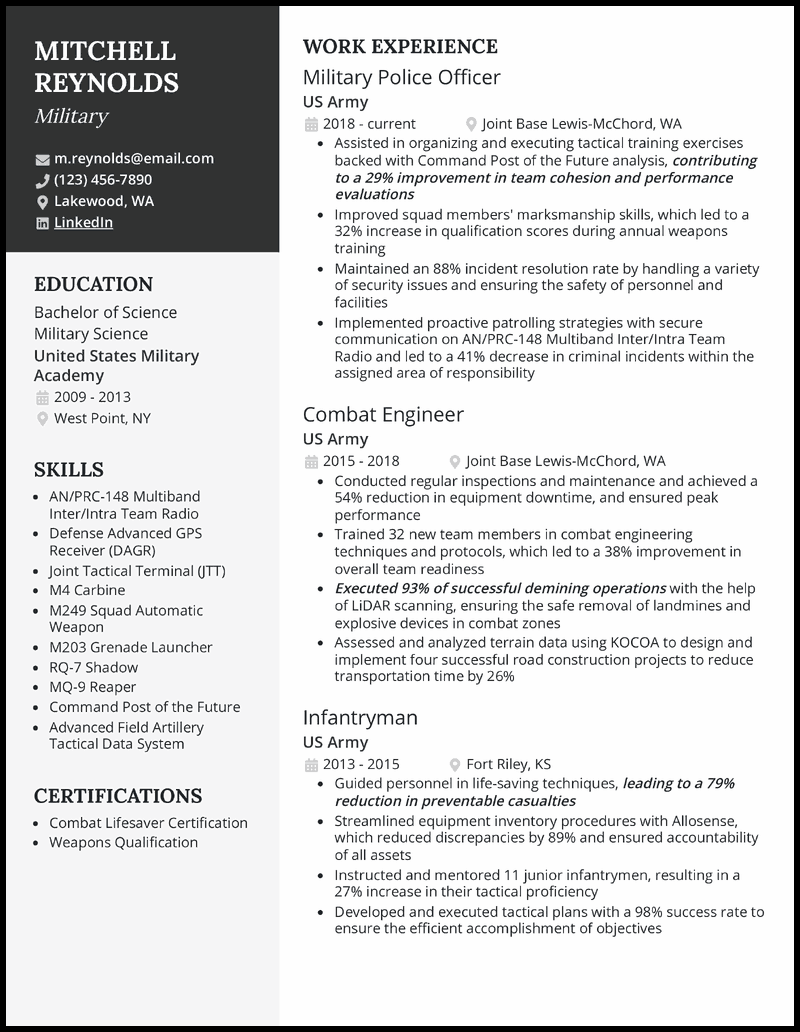
Why this resume works
- Therefore, you should mention in your military resume your contribution to decreased equipment downtimes to underline your input to team support.
Military Veteran Resume
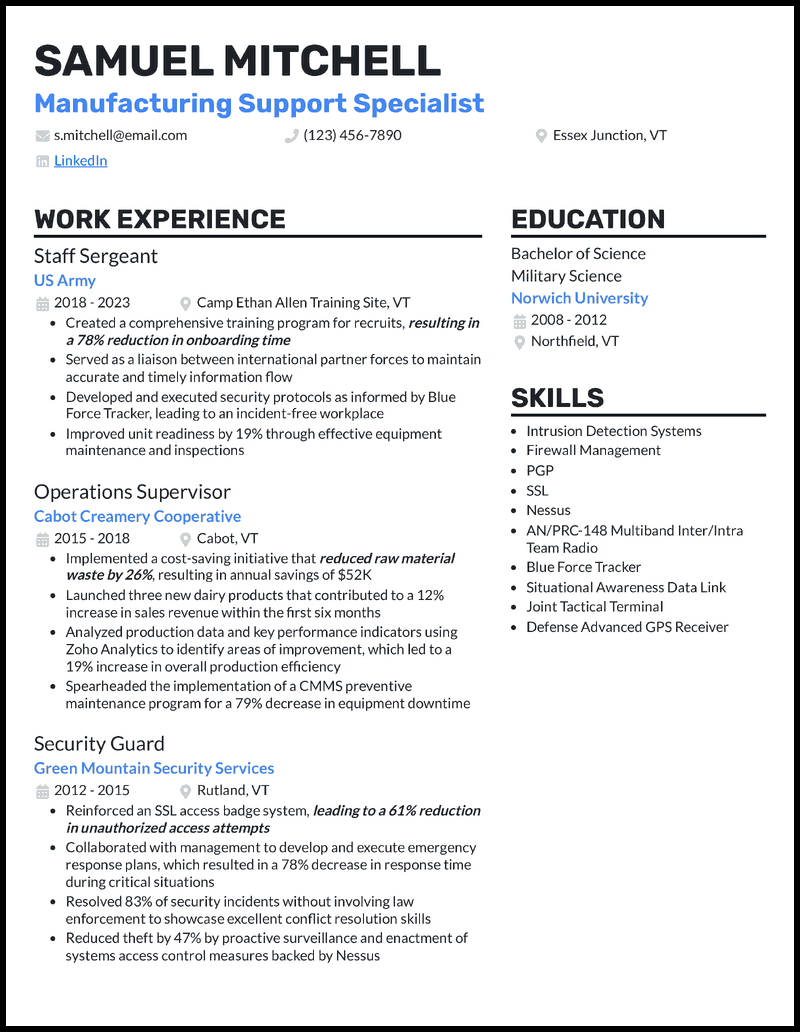
- To make such an achievement count in your military veteran resume, highlight how much you helped reduce equipment downtime to sustain uninterrupted workflows.
Retired Military Resume

- Speaking of your experience, list your missions and other roles in reverse chronological order, with your most recent positions and more impactful achievements taking precedence. Finish off this outline with side columns highlighting your military coursework, skills, and certifications.
Military Police Resume

- For instance, “Assisted in slashing response times” could be better put as “Instituted advanced emergency protocols using NEC NeoFace, slashing response times by 44%.”
Military to Civilian Resume

- It underscores your ability to communicate effectively and ensure that all objectives are met within set timelines; attributes that make you an easy pick for joining the civilian workforce.
Related resume examples
- Officer Manager
- Operations Manager
- Office Administrator
Create a Military Resume That Fits Your Dream Job

Your military personnel resume should focus on showcasing skills vital to defense and strategic operations. Precision is paramount, so avoid vague terms like “team player.” If your role is technical, zero in on hard skills instead.
Some of the things you could discuss include your proficiency in various weaponry, tactical strategies, and specialized equipment operation. You can also consider highlighting soft skills like leadership, communication, and crisis management.
Ensure your skills resonate with the job’s requirements, whether it’s combat tactics or logistical coordination. Highlight the elevated level of discipline and stress management skills your service in the military has helped you develop, be it for another role within the military or a civilian job.
Looking for guidance?
15 best military skills
- Tactical Strategy
- Weapon Proficiency
- Logistical Coordination
- Military Comms
- Cybersecurity
- Foreign Languages
- Crisis Management
- Radio Operations
- Risk Assessment
- Joint Tactical Terminal
- Blue Force Tracker
Your military work experience bullet points
Between orchestrating strategic missions and leading successful teams, your military service showcases exceptional achievements. Rather than rehashing routine tasks, spotlight your impactful contributions.
Your role directly influences the stability and security of operations, safeguarding national interests, and minimizing potential risks. While the nature of your experiences varies, harness this section to highlight your proudest moments, whether enhancing emergency response efficiency or mitigating adverse consequences.
Make sure to back up your claims with quantifiable metrics to zero in on the magnitude of your successes. These could be anything from your budget optimization to the number of personnel you’ve trained—it all depends on your specific role and achievements.
- Demonstrate your leadership and strategic skills with mission success rates.
- Showcase your ability to make quick decisions under pressure with metrics on your average response times.
- Highlight your commitment to operational readiness by presenting the percentage decrease in equipment downtimes after implementing maintenance protocols.
- Show off your adaptability by mentioning the varying shifts you’ve worked, deployments you’ve been sent on, and languages you’ve learned.
See what we mean?
- Created a comprehensive training program for recruits, resulting in a 78% reduction in onboarding time
- Conducted an employee satisfaction survey, resulting in an 88% satisfaction rate with internal communication efforts
- Maintained an 91% incident resolution rate by handling a variety of security issues and ensuring the safety of personnel and facilities
- Implemented a new internal communication system, which resulted in a 28% reduction in information gaps among employees
9 active verbs to start your military work experience bullet points
- Coordinated
- Implemented
3 Tips for Writing a Military Resume Without Much Experience
- Emphasize the significance of every role you’ve undertaken, regardless of your experience level. You can include relevant skills and accomplishments from your military service, training, and related roles. For instance, if you’re transitioning to a civilian logistics position, highlight your experience coordinating complex missions and managing supplies.
- Use your military projects to showcase your skills and flexibility. Mention specific initiatives or tasks you’ve executed during your service that align with the new position or civilian job you’re applying to. For example, discuss leading a team to establish a forward operating base, demonstrating your leadership and strategic planning abilities.
- Utilize internships, relevant coursework, or hobbies to spotlight transferable skills. Highlight leadership, teamwork, adaptability, and technical proficiencies that align with the role. For example, when applying for a communications role, discuss your experience with working in large teams and communicating under stress.
3 Tips for Writing an Experienced Military Resume
- If you have specialized military skills like leadership, logistics, or intelligence analysis, show them off. Next, tailor your accomplishments and metrics to align with the specific role you’re pursuing, highlighting your expertise and achievements in those areas.
- Adding relevant metrics really makes your achievements stand out more. Highlight your mission success rates, operational efficiency improvements, and leadership impact. This is good if you’re transitioning away from the military; for instance, in a logistics role, you can discuss how you optimized supply chain processes, reducing turnaround time by 39%.
- Include relevant military certifications that demonstrate your expertise and training. Whether it’s command certifications, technical training, or specialized courses, these credentials highlight your readiness for the civilian role or a promotion up the military ranks.
While optional, a tailored career objective or summary can be valuable, especially if you’re switching to a whole new career. Emphasize your military experience and skills that align with the job, such as leadership, logistical coordination, or crisis management.
Make sure to use relevant keywords from the job description . Highlight your military accomplishments, skills, and specialized training that match the job requirements. ATS looks for keyword matches, so use terminology from both your military background and the civilian role you’re applying to.
Emphasize mission success rates, response times, equipment maintenance improvements, and any other quantifiable achievements. These metrics demonstrate your effectiveness in critical situations and your ability to impact operations positively.

Military to Civilian Resume Guide: Examples & Essential Resources

Our customers have been hired at: * Foot Note
A military career has given you the skills and experience to build a great career. We can help you create a resume that effectively communicates your skills and experience to potential civilian employers. Whether you are just beginning your job search or looking to take the next step in your career, a military resume guide is an essential resource that can help you achieve your goals and successfully transition to civilian life.
This guide gives you the tools you need to translate your military experience into civilian-friendly language, showcase your skills and accomplishments, and effectively market yourself in the job market.
In this guide, we’ll show you:
- Expert military resume samples
- Step-by-step military resume writing guide
- Innovative tools & AI to craft your military resume
- Essential tips for a successful military-to-civilian transition
- Valuable resources for your civilian career journey
Difference between a military and civilian resume
Transitioning from a military career to a civilian one requires more than just translating military jargon into civilian language. The structure and content of a military resume differ significantly from that of a civilian resume.
These are the main differences between a military resume and a civilian resume:
- Length: A military resume is detailed, including important military career information such as unit, locations, ranks, branches served, duties, award and achievements. This information alone and lengthen the resume. A civilian resume is one to two pages long, focusing only on job-relevant qualifications.
- Skills : A military resume must highlight your military job duties and responsabilitis. Meanwhile, a civilian resume will be focused on the job-relevant skills the candidate brings to the table, not their entire skill set.
- Terminology : The armed forces have their own language. The Department of Defense even created a dictionary, including acronyms. A military resume can use these terms, but a civilian resume simply uses professional English language.
- Formatting : Military resumes tend to be more uniform and structured, while civilian resumes allow for more creativity and flexibility in terms of format and layout. In both instances, the resume must keep a professional layout.I 2I 2I Hi 111122
Understanding these differences can be a critical step in achieving your career goals and in preparing your military to civilian transition resume.
Military-to- civilian resume examples
These military to civilian resume examples show you how it can be done. Looking for an example in a specific industry? Our resume examples collection has them.
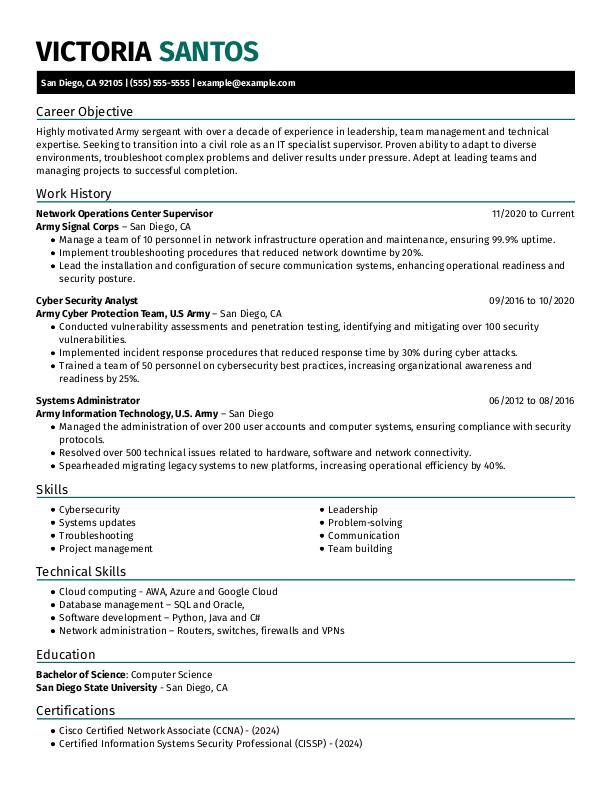
Careers for your military to civilian transition
Health care
Information technology
Make a resume with My Perfect Resume
Our Resume builder can help you write the perfect resume. Start Now!
How to write a military to civilian resume
Writing a military resume requires a unique approach to effectively showcase your skills, experiences and qualifications gained during military service. While you will receive the required documentation to write a resume , this quick guide will help you create a winning military to civilian resume.
- Write a compelling professional summary
If the recruiter reads nothing but the top of your military resume, which information from your career history will grab their attention? A professional summary is your introduction to the hiring manager. It uses three to five sentences to present yourself, your years of experience, expertise and an important accomplishment — or two! As a professional in transition, you can also include a sentence stating your future plans or the role you’re seeking.
For example:
- Build a work history using civilian terminology
Your work experience section is essential in your military transition resume. It will show a potential employer what you can do. Whether you name it professional history or work experience, it must include your relevant experience, the position name and employment dates.
A key component of your military to civilian resume will be your Verification of Military Experience and Training, or VMET, which helps you translate your skills and experience from the armed forces to the civilian workforce.
The VMET is a thorough document outlining your entire military career and it will include an equivalent to use in your resume. For example:
Dates : June 2021 – Present (2 years 8 months)
Organization : US Army, 1st Infantry Division, 2nd Brigade Combat Team, Alpha Company
Location: Fort Hood, TX
Title : Infantry Company Operations Officer (S3)
- Conducting mission planning and briefings for offensive, defensive and stability operations (equivalent to project management and logistics planning).
This VMET entry can translate to:
Infantry Company Operations Officer US Army Jun 2021 – Current
- Planned, executed, and briefed offensive, defensive and stability operations, aligning with civilian project management and logistics planning.
The skills section of a military to civilian resume is a crucial component that showcases the unique abilities and experiences acquired during military service. Transitioning from the military to the civilian workforce requires effectively translating military skills into marketable qualifications that employers can understand and appreciate.
Once again, use your VMET and choose 6 to 10 skills for a resume that works best with your application. Analyze the job description and emphasize the skills that are most relevant to the position, ensuring that you present yourself as a strong candidate.
- Education and Training
The education section of a military to civilian resume should highlight academic qualifications, specialized military training, relevant coursework and academic honors or awards. List degrees and certifications obtained, along with the name of the institution and date of completion. Mention coursework or training that demonstrates proficiency in a specific field or industry and any academic honors or awards received.
It’s essential to include any specialized military training or certifications applicable to the civilian job you’re applying for. Lastly, if you’re still pursuing a degree or certification, mention it, along with the expected date of completion. An effective presentation of education demonstrates commitment to continuous learning and professional growth.
Military to civilian resume objective examples
A well-crafted resume effectively communicates how your military background aligns with your desired civilian career path. These examples highlight how to combine your military years of experience and job-relevant skills to show the qualifications you bring to the table.
Transitioning military leader with 15 years of experience in aviation seeking to apply strong analytical and decision-making skills to a challenging Operations Manager role in the airline industry.
Dedicated and resourceful former Marine Corps veteran with a passion for logistics. Seeking to utilize leadership skills, supply chain management expertise, and a strong work ethic to contribute to a meaningful role in the transportation and logistics industry.
Recent Army veteran seeking to utilize infantry experience and expertise in team building and risk assessment in a law enforcement role.
Highly motivated to utilize leadership, problem-solving, and strategic planning skills gained in the military for a successful career in management consulting.
Recent Chief Warrant Officer with 8 years of experience in aviation seeking to utilize expertise in resource planning and process optimization in an Operations Manager role in the airline industry. Possess strong communication, teamwork, and adaptability skills acquired through military service.
Seeking to leverage 10 years of military experience in logistics to secure a Supply Chain Manager position within a reputable manufacturing company.
Highly motivated to translate military experience in mechanical engineering and skills in project management, problem-solving, and teamwork to a meaningful role within the manufacturing industry.
Retired Military Sergeant with expertise in human resources seeking to utilize leadership, team management, and communication skills in a corporate HR role.
Seeking to transition military skills in project management, team leadership, and communication to a challenging role in the IT industry field.
To translate 10 years of experience as a cybersecurity specialist in the US Air Force into a Cybersecurity Analyst position leveraging my proficiency in network security, risk management, and incident response. Committed to contributing a strong work ethic and a results-oriented approach.
Career tools for your military to civilian transition
When transitioning from military service to a civilian career, having the right tools at your disposal can make all the difference. Counseling services provided by the military or civilian organizations can help you identify your career goals and create a transition plan.
- My Perfect Resume’s Resume Builde r — Find prewritten bullet points and resume templates specifically designed for transitioning military personnel. With user-friendly features, it helps create a professional resume that highlights transferable skills and boosts your chances of landing a civilian job. Plus, you can confirm your military transition resume works using the ATS Resume Checker .
- American Job Center s — A valuable resource for military personnel transitioning to civilian careers. They offer job search assistance, career counseling and training programs to help with the transition process.
- CareerOneStop — An online portal that provides a wide range of resources, including career exploration tools, job search assistance, and information on training and education programs.
- Department of Defense Credentialing Opportunities On-Line — Helps service members translate their military skills into civilian credentials and certifications, making them more competitive in the job market.
- HIRE Vets Medallion Program — Recognizes employers who hire and support veterans, providing a valuable resource for job seekers.
- Transition Assistance Program (TAP) — Provides comprehensive transition assistance to service members, offering workshops, counseling and resources to help them successfully transition to civilian life.
- VA Solid Star t — A program that ensures transitioning service members receive personalized support and resources from the Department of Veterans Affairs to promote a successful transition into civilian life.
In addition to the government resources, you can find private and non-for-profit assistance like:
- American Corporate Partners — A non-profit organization that offers mentoring and career development programs for veterans. This program pairs veterans with corporate professionals who provide guidance and support as they transition to the civilian workforce.
- American Legion — Provides a range of services to veterans, including job search assistance, education benefits and advocacy. It is one of the largest veterans organizations in the United States.
- Veterans of Foreign Wars (VFW) — It has a range of services to veterans, including job search assistance, education benefits and advocacy as well as the VFW Transition and Employment Resource Center.
These are only a few examples of the organizations that can help you translate your military experience into a successful civilian career. Combine their knowledge with our Resume Builder for a smoother transition in your career.
Stay ready in your job seeking process with our Ultimate Job Interview Guide . Learn about the 10 most common job interview questions, what to ask and how to prepare for the big day.
Tips to build your military-to-civilian resume
- Choose a military resume template to fit your information and show your professional style.
- Figure out your next step. Customizing a resume for its intended purpose improves your chances of getting noticed. There is no need to figure out your entire career immediately, just what you’ll be using your resume for.
- Use civilian-friendly language and avoid military jargon. Focus on highlighting skills such as leadership, teamwork, problem-solving and adaptability.
- Include quantifiable accomplishments in your experience section to show how successfully you’ve used your skills.
- Take advantage of civilian transition programs. The Veterans Affairs Department is dedicated to assist you in life after the armed forces, including figuring out employment. Don’t limit yourself to just the VA. Use other resources, like the Department of Labor’s CareerOneStop, Veterati, American Corporate Partners’s Mentoring program, among others.
- Start working on your transition to the civilian side 18 months before it happens. This will allow you to request all the necessary documentation to help you build a resume and find your next step.
- Learn from resume examples for different industries. A resume example can show you how a good resume looks and what it includes, as well as finding a military resume template to fit your personality during your civilian transition.
Key takeaways
- A military resume is a key component in your transition to civilian resume.
- Request your VMET document before you start working on your military resume. It’ll help you translate military terminology to the civilian workforce.
- Tailor your resume to the application. Whether you’re using the resume to apply for a job or complete a college application, use the application guidelines to customize your military transition resume.
- Use the available tools, like our Resume Builder, to write your military resume confidently and backed by expert guidance.
- A resume builder can also take out the guesswork when it comes to your military resume template. It will automatically adjust your content to fit your template and allow you to customize as you go.
- Find all available resources to help ease your transition into the civilian workforce: from official government channels to private assistance and mentorship programs. Understanding your next step will help you create a military to civilian transition resume that works.
Make a cover letter with My Perfect Resume
Our Cover letter builder can help you write the perfect cover letter. Start Now!
How to put military experience on a resume?
To put your military experience in your transitional resume, you must request your VMET. This document will help translate your military experience to civilian terms. Plus, it’ll show exactly which hard skills you developed through your armed forces career.
How to convert military work into a civilian resume?
To translate your military experience into civilian, follow your VMET document. It will provide you with a thorough description of your role in the armed forces, including the skills learned or used for each job. It will also include the American Council of Education (ACE) accreditation recommendations — if available. Before you start writing, understand the job requirements to tailor your military to civilian resume accordingly.
How to list military experience on a resume older than 10 years?
Resumes should only include the last 10 years. However, if you want to include your military experience, keep it to one entry with your highest rank and include three bullet points with your strongest achievements. You can write more than one sentence per bullet point to showcase your military experience and accomplishments.
What document can I use as my resume when I get out of the military?
You will create a resume when leaving the military. The document that will help you write a military to civilian resume is the VMET. It will contain every single skill, ranking, experience, education and completed training obtained when you were in active duty. It is incredibly useful in translating military terminology to the civilian world.
How long is a military resume?
A military to civilian resume is one or two pages long, just as any other resume. Remember, you are not writing a resume to fit all your applications. You must tailor a resume for every single application to show the hiring manager your job-relevant qualifications. A resume builder can help you quickly adjust your military transitional resume while saving previous iterations to edit again and again.
Should I put my military experience on my resume?
Yes! Military service is a great asset to any career, whether in the private, public or non-profit sector. It will show your commitment, leadership and teamwork skills, which are essential in all industries.
Rate this article
Veterans and Military Personnel
4.5/5 stars with 100 reviews

Nilda Melissa Diaz, CPRW
Career advice expert.
Nilda Melissa is a Certified Professional Resume Writer who has written for The Washington Post and Latina Style Magazine. She has a master's in Journalism from Columbia University and is a member of the National Association of Hispanic Journalists.
Related Content

Top 2024 Workplace Trends [Statistics & Expert Insights]

By Kellie Hanna, CPRW
December 15, 2023

Sites with Job Listings
By Nilda Melissa Diaz, CPRW
December 08, 2022
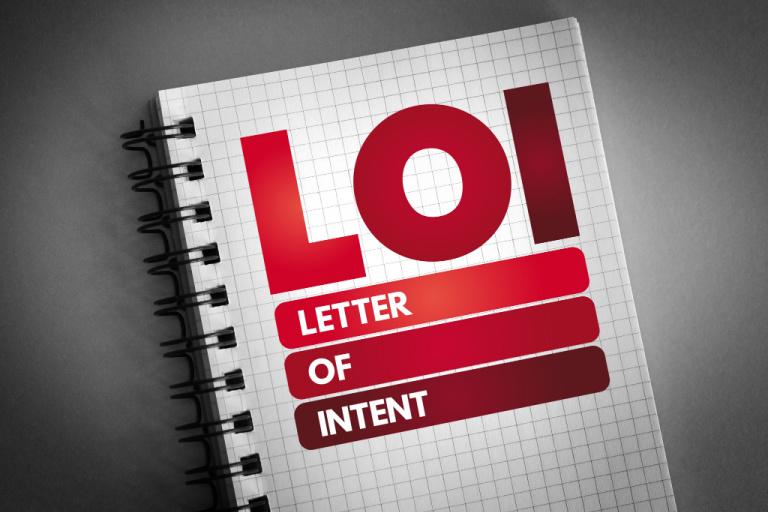
How to Write an Impressive Letter of Intent (+ Tips and Examples)
October 17, 2022

When and How to List References on a Resume
November 27, 2023

For Students: Five Steps to a Successful Salary Negotiation
October 05, 2023

4 Skills Hiring Managers Want In Job Hunters (But Can’t Often Find)
January 10, 2024

*The names and logos of the companies referred to above are all trademarks of their respective holders. Unless specifically stated otherwise, such references are not intended to imply any affiliation or association with MyPerfectResume.

The best resume writing services for military-to-civilian employment
Improve the odds of landing your dream job with a professionally prepared military-to-civilian resume.
We may earn revenue from the products available on this page and participate in affiliate programs.
The top resume writing services for military to civilian transitioning can help members of the armed forces translate their uniformed background into private sector work experience. Many veterans can find it tricky to express their vast operational and leadership know-how to meet the needs of today’s employer. For example, resumes that state your “MOS was 11B” may mean very little to a hiring manager. But when you convert military abbreviations and jargon to show your “role in the infantry was to manage the safety of equipment appraised at over $1.5 million,” then managers have a much clearer understanding of the value you bring.
Employers are keen to find professionals with your teamwork and critical thinking skills. And, you don’t have to transition from your military careers into the private sector alone. There are resume consultants who are eager to assist you. So if you’re ready to make the leap from chopper to cubicle, the first step is gathering hiring materials like cover letters, thank you emails, resumes, and in today’s job market — a compelling LinkedIn profile. Keep reading to discover resume writing services for military members and veterans seeking employment with civilian companies.
- Best Online Service: Find My Profession
- Best for IT: TopResume
- Best for Writing CVs: Career Confidence Resume Services
- Best for Executives: Great Resumes Fast
- Best for Federal Jobs: TopStack
Find My Profession

While most resume writing companies are online these days, it doesn’t necessarily mean they’re all good at it — which is why many regard Find My Profession hard to compete with when it comes to ease of use, a smooth process, and online career resources for digital natives. For those who are transitioning from military careers into the civilian workforce, Find My Profession may offer an efficient and speedy online service at a competitive price.
This company’s online offerings provide a variety of solutions for military members seeking entry-level positions, managerial roles, and executive careers. It even extends support for curriculum vitaes (CVs) and federal resumes. All packages come with a 60-day guarantee and options for LinkedIn networking, interview coaching, and career counseling. You can even opt to let the team at Find My Profession take over your job search for you — it’s sort of like reverse recruiting.
Trustpilot gives Find My Profession 4.9 out of five stars, and many reviews highlight the company’s results-oriented approach and affordability. Find My Profession says its clients have been hired by the likes of Apple, Nike, Tesla, Morgan Stanley, the Department of Justice, and other high-profile employers. To find out if this service is right for you, take a look through its sample resumes and testimonials.
- Online service with options for phone correspondence
- One-on-one session with your resume writer
- Three- to five-day turnaround time
- If you’re looking for an online maker of military-to-civilian resumes, then you should check out this zippy service that offers job hunters a wholly digital platform.
Federal resumes, C-level, and curriculum vitaes also available
Member of the Professional Association of Resume Writers and Career Coaches (PARWCC)
Packages come with one week of unlimited resume revisions
Packages with higher price points may be required to enjoy all benefits
LinkedIn profile not available with all packages
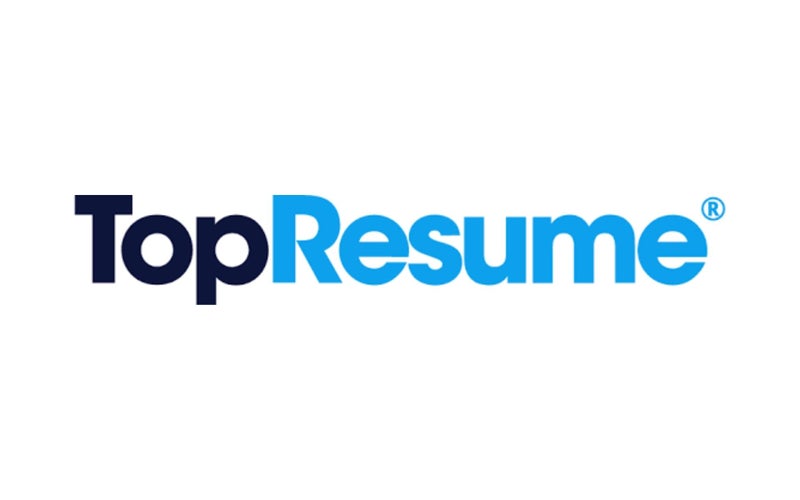
Nearly 99 percent of Fortune 500 companies simplify the hiring process by scanning and filtering resumes using some form of applicant tracking software (ATS), according to a recent Jobscan report. Smaller companies, too, have adopted similar digital methods. This is why commissioning a resume service with modern IT baked into its process can help get you seen by employers that are keen to identify candidates quickly.
In addition to its ATS-optimized system, TopResume offers a Military Resume Package that pairs you with a military resume expert who will align your service experience with the types of jobs for which you’re applying. You’ll also receive a cover letter, up to three resume revisions, and unlimited email correspondence with your consultant. TopResume also has a selection of other non-military resume packages, each with their own terms and offerings.
TopResume features testimonials and reviews on its website, many of which are written by former military service members. In fact, you can review a sample of the company’s military-to-civilian resumes, along with examples from other industries. TopResume has earned 4.2 out of five stars on Trustpilot, where over 70 percent of its some 11,000 customer reviews give it “excellent” ratings.
- Industry-leading ATS-optimized platform
- Speciality services for Army, Air Force, Marine Corp, Navy, and Coast Guard
- Military Resume Package starts at $199
- Jobseekers who are looking to get one step ahead of the competition may like what they see with TopResume. Its internet technology is arguably second to none.
Federal resumes and curriculum vitaes also available
Free resume critique via online upload
Turnaround time is generally under seven business days
Military Resume Package does not include a money-back guarantee
May not be ideal for those looking for managerial or C-suite level roles
TopStack Resume

Many military members find themselves in federal jobs after their uniformed service. But not only do some struggle with translating military jargon into civilian vocabulary, even more find the federal resume itself quite challenging. That’s because federal jobs require specialty resumes that are often four to six pages long with formatting that varies by department. In these cases, a federal resume expert like TopStack is critical in helping military personnel apply for government jobs.
TopStack furnishes new customers with a choice of packages, all of which can be paired with its federal resume service. Yet those who select its Premium Package will presumably enjoy the most that TopStack has to offer, including working with the most experienced writers, 60-day interview guarantee, phone and email correspondence, career counseling, and an optimized LinkedIn profile — that’s in addition to your federal resume and a cover letter.
Still, TopStack’s standard of service can take upwards of 10 business days to deliver. Plus, its interview guarantee is not a money-back guarantee. If you’ve applied to at least 10 jobs and not received any interviews within 60 days, TopStack will only provide one-on-one career guidance and application support, free of charge. So you’ll need to look elsewhere for a faster turnaround or an actual money-back offer.
TopStack receives 4.9 out of five stars on Trustpilot, and many customers praise the company for its effectiveness and affordability. Besides these accolades, TopStack donates five percent of its profits to the Fisher House Foundation, which is a charity dedicated to providing free lodging to families of hospitalized military members.
- Payment after you approve the first draft of your federal resume
- Two rounds of revisions included in all packages
- One-on-one career counseling and other services available
- If you’re confused by the strict resume formatting required for federal jobs, then TopStack might be right for you. It's an industry leader in federal resume writing.
Select packages come with a 60-day interview guarantee
All resumes are ATS-friendly
Discounts and promotions for return customers
Turnaround times are upwards of two weeks, which is longer than other options
No money-back guarantee
Career Confidence Resume Services
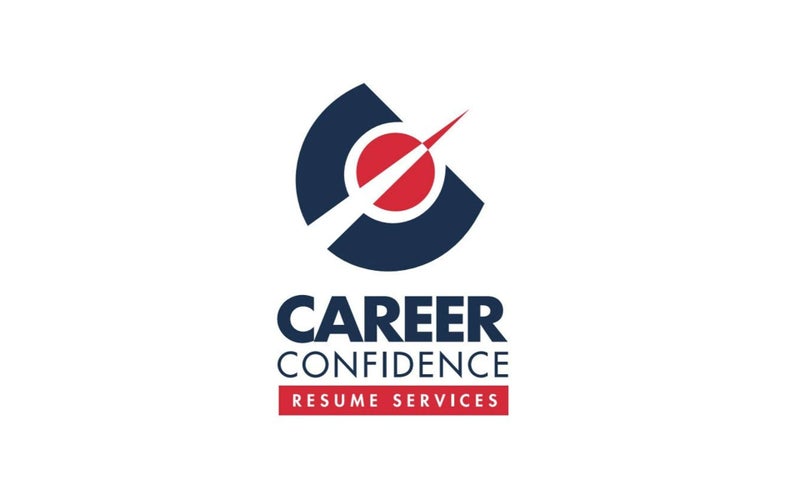
Whether you’re a researcher pursuing your dream job or you’re seeking international employment, the perfect curriculum vitae (CV) will get you noticed. But not all resume services are right for this type of document, and even fewer are qualified to translate your military record into civilian work experience. But the team at Career Confidence Resume Services is well-equipped to help military members and veterans find work that is commensurate with their educational and service backgrounds.
Career Confidence was founded by Cassie Hatcher, a self-professed former Air Force brat who works with a team of military spouses who can leverage their unique insights to assist members from “all military branches and across a wide range of Military Occupational Specialties (MOSs).” You’ll receive two versions of your CV — one that is more general and the second that is tailored for a specific role. Furthermore, your CV will be assessed by a CVCS and CPRW (see above), and it comes with a money-back guarantee. Career Confidence also provides a custom LinkedIn profile, and it will throw in a 200-page ebook to guide you through your job search.
That said, the biggest drawback to Career Confidence is that this boutique service only has the capacity to assist a limited number of clients at a single time. So if you’re in a rush, a company that is built for volume may be better suited to your needs.
While we couldn’t find any customer reviews on Trustpilot, Career Confidence showcases testimonials from its military customers, some of whom have landed employment with Northrop Grumman, Amazon, Verizon, and the Civil Aviation Authority, to name a few. You’ll also find sample resumes, career resources, and an option for a free resume review on the company website.
- Dedicated military-to-civilian resume service
- All packages include an ATS-friendly resume, Linkedin optimization, and email support
- Certified Veteran Career Strategists (CVCS) and Certified Professional Resume Writers (CPRW) available
- Scholars who need to incorporate military service into their curriculum vitae might have a lot to like about this company’s expertise with both academic writing and military life.
Full 100 percent money-back guarantee
Free resume review
Career and job search resources
Limited number of clients at any given time
No “hard” pricing; costs vary by customer
Great Resumes Fast
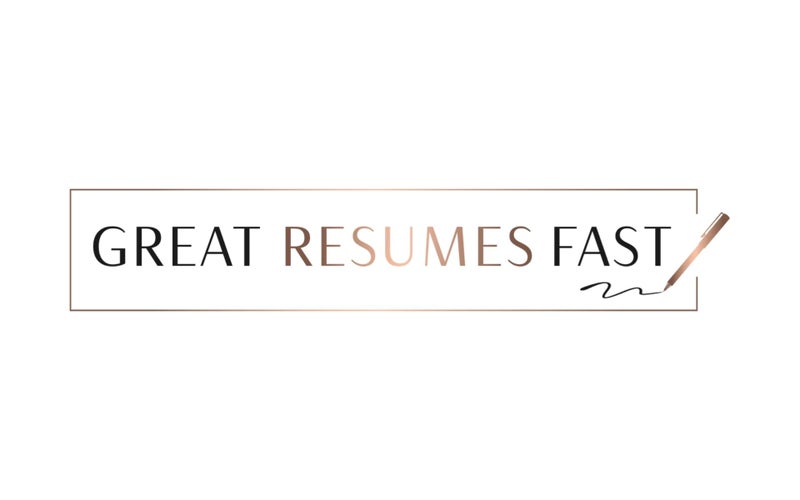
Regardless of your military rank, your service background makes you a strong contender for executive positions with many private sector companies. Undoubtedly, Great Resumes Fast is up to the task of communicating your skill set effectively.
This company’s C-Level Job Alignment package is designed to bring your candidacy to the attention of hiring managers. You’ll have access to the full range of services that the standard packages provide, including an ATS-friendly resume, a custom LinkedIn profile, cover letter, and two rounds of revisions. But you’ll also receive a customizable thank you letter, a value proposition letter, and a professional career biography. Additionally, you’ll work directly with a writer who has proven executive and C-suite level hiring experience.
That’s an impressive set of tools to work with, but it comes at a premium. This vendor’s resumes can cost nearly $3,000, but considering the concierge service you’ll get and the potential pay off when you land your corporate job, the investment in yourself could be worth it. Still, there are other amazing resume builders out there who can support your job search for much less money.
Great Resumes Fast has earned a 4.9 star rating from Trustpilot, and almost 90 percent of its reviewers ranked the company as “excellent.” What’s more, you’ll find success stories and testimonials on the website, including one case study that features a former military service member who transitioned into an executive role with a civilian company.
- Process begins with a 25-minute phone call with the company founder
- Turnaround in three to five business days
- Two rounds of revisions included in every package
- Professionals searching for tailor-made executive resumes should know about Great Resumes Fast. It provides next-level service and support for applicants who are serious about landing that big job.
Full 100 percent customer satisfaction guarantee
SEO optimization for LinkedIn profile
Customizable cover letters
Premium packages may be cost-prohibitive for many
Things to consider before choosing a resume writing service for military
Resume writing for military service members and veterans.
Resume services can take the stress out of writing a military-to-civilian resume, but service members and veterans do have other options, many of which are free. The U.S. Department of Veterans Affairs provides an online employment toolkit with career counseling, job search guidance, and resume writing advice.
Veterans can also receive resume support through the Veterans Employment Center, as well as free online-based services through VetNet . In addition, many U.S. military bases and installations offer civilian transition instruction. You may also find resources with charitable organizations, such as HireOurHeroes , that specialize in mentoring service members as they begin their journey in the civilian workforce.
How resume writing services work
Resume-writing services create tailor-made hiring documents that are specific to the job seeker. You’ll generally work one-on-one with an expert who will use your employment history as the basis for a resume that will appeal to both human resources managers and job applicant tracking systems. Communication between you and your resume writer often takes place by phone or via email, but occasionally you’ll upload your details through the company’s website.
The cost of a resume writer varies depending on the level of service you require. However, you can typically expect to pay at least $150 for some of the more basic offerings, and upwards of $3,000 for an executive resume or a helping hand with your job search.
Evaluating resume writing services for military personnel
When choosing a resume maker for your military-to-civilian transition, look for companies that highlight the qualifications and backgrounds of their writers. Vendors that do not employ certified writers may be cheaper, but you’re potentially purchasing an inferior product. Similarly, you’ll benefit from direct correspondence with your writer, which can take place through phone calls, video meetings, or even email. It’s this type of one-on-one collaboration that will truly yield an effective resume. Also, prioritize companies that offer some form of guarantee. If a service doesn’t stand behind its product, then that’s generally a red flag that you’re working with an inexperienced team.
FAQs about resume writing services for military
Q: is it worth paying for a resume service.
A: Yes, it’s generally worth it to pay for a resume service, especially for military members who are inexperienced with the private sector. An expert can translate your military background into civilian work experience and provide a polished, ATS-optimized resume.
Q: What are employers looking for in a resume?
A: Employers want to see resumes that show alignment between an applicant’s experience and a hiring manager’s expectations for a role with their company. Resumes should be scannable, honest, and formatted to display your qualifications in a coherent employment history.
Q: What are most resumes missing?
A: Many military-to-civilian resumes are missing relatable work experience that is expressed using modern vocabulary. It’s important to translate military abbreviations, acronyms, and jargon into qualifications and skill sets that recruiters can easily understand.
Q: What words should not be used in a resume?
A: Military service members and veterans who are transitioning into the civilian workforce should avoid using words on their resumes such as medal, platoon, mission, and subordinates, to name a few. Instead, substitute those jargon words with terms like award, team, task, and employees.
Final thoughts
Resume-writing services for military members and veterans can relieve much of the stress from a job hunt in the civilian workforce. Many services will provide you with all of the hiring materials you need to successfully find a steady, well-paying job. Yet, those who do not want to pay for a commercial service may find support through the VA employment center or with non-profit organizations. Review your options beforehand to ensure you’re making an informed decision.
Methodology
To choose the best resume writing services for this list, the team at Task & Purpose looked at a large number of companies. We focused on cost, plan features and options, ease of use, customer service reviews, and past customer ratings as the most important factors in our ratings. Learn more about our methodology in the Task & Purpose review guide .
Subscribe to Task & Purpose Today
Get the latest in military news, entertainment and gear in your inbox daily.
Military Resume Examples
Table of contents.
- 1. Introduction
- 2. What to Include in a Military Resume
- 3. How to Write the Military Resume Summary Statement
- 4. How to Write the Military Resume Education Section
- 5. How to Write the Military Work Experience Section
- 6. Action Verbs to Include in Your Military Work Experience Section
- 7. How to Write the Military Resume Skills Section
- 8. Should I Include References in my Military Resume?
- 9. Military Resume Fails: Mistakes to Avoid
- 10. Job Prospects in the Military to Civilian Field
Introduction
Returning from the military to civilian life and finding a government or private sector job might seem like an overwhelming task. But if you’ve spent some time in uniform as an officer or enlisted person, and you’ve been through basic training, cruises, and deployments, then you should be confident in your abilities and accomplishments – just get ready to tackle the resume creation process one step at a time.
The first step will involve creating a resume that grabs employer’s attention and increases your chances of landing an interview. As you launch into the resume writing process, you’ll have two choices: You can build your own document section by section from the ground up, or you can rely on resume creation and editing tools (like Livecareer) that can help you choose a template and populate each subsection with the right information.
If you go it alone, you’ll still have access to plenty of tips and resources, including the collection of military resume samples shared here. These military resume samples can demonstrate the kind of presentation and formatting your employers will be looking for. And just as important, military resume samples like these can give you a feel for the kind of language and phrasing that can get your message across in the civilian workforce.
In addition to these military resumes samples, examine the sections below for writing and editing tips, mistakes to avoid, and descriptions of the information you’ll need to include in your document.
What to Include in a Military Resume
As you review these military resume samples and start putting your profile together, you’ll need to think carefully about the nature of the position you’re searching for. You’ll also need to do plenty of research. Military resume samples only really have one thing in common: the applicant’s past. Every applicant’s future will look very different based on the position he or she wants to step into. In this particular resume category, our advice will focus on making the most of where you’re coming from; where you’re going will be up to you. For example, your message will vary if you’re looking for work as a grade school teacher, a paralegal, a police officer, an EMT, or an office manager.
Even within your target industry, you’ll need to align your resume with the requirements of a specific job. Review these military resume samples and look for similarities that may carry over and apply to your own set of goals. As you do so, you’ll notice that most of these military resume samples can be divided into the following subheadings:
· Resume Summary
· Education Section
· Work Experience Section
· Skills Section
What’s more, most resumes can be separated into one of two major formats . As the military resume samples illustrate, you can choose between a chronological layout that presents each previous position in order of occurrence, or you can choose the functional layout , which emphasizes skills and abilities rather than the dates and details of former jobs. You can also choose to mix these two styles and present a combination format that doesn’t quite fit into either category but still gets your message across.
In most cases, civilian employers find the functional format easier to use and understand than the chronological format when they’re reviewing the resumes of current and former military personnel, so this may be the most effective presentation depending on your needs. Look for more information about these three options under the work history subheading below.
Related Skills
- Military aviation
- Military training
- Military procedures
- Military experience
- Military operations
- Military band background
- Military aircraft functions
- Military personnel safety
- Military bridge assembly
- Military maintenance requirements
How to Write the Military Resume Summary Statement
No matter how you present your work experience, and no matter the order in which you present your other resume subheadings, you’ll always need to start your document with a clear, short, information-packed resume summary. Every successful resume starts with a few introductory lines that highlight the applicant’s most important credentials and provide a forecast of the information to follow. Military resumes are no exception.
Your summary will not need to exceed about four or five lines of text, and your details should be concrete and targeted to the position you’re looking for. In addition to the military resume samples, here are a few example summaries:
- Marine Corp Military Police Officer in search of narcotics investigation position with Saint Mary’s Country PD. Have a BA in criminal justice, security detail experience, extensive field training, and experience with successful undercover operations. Expertise with crime scene management and counterterrorism simulation.
- Forces Captain, US Army, seeking project management role at the director level for APEX Systems. Held command, control, and administrative responsibilities for 12-person Special Forces detachment in remote area of Iraq. Handled 42,000 dollar budget and all equipment management, maintenance, advisory and training requirements for indigenous and coalition forces within a four square mile compound.
How to Write the Military Resume Education Section
After you complete your brief summary, you’ll move on to the next required sections of your resume, which can be placed in the order you choose. Some applicants, but not all, follow the summary with the education section.
This section will include a succinct, facts-only description of your educational credentials, certifications, and specific, relevant training. List each of your academic degrees if you have them, including two-year associate’s, four-year bachelor’s, master’s of arts or science, PhDs, and professional degrees. Include each distinction even if you haven’t completed your program just yet—you can list graduation dates that lie in the future as long as you’re enrolled. Include your degree, course of study, institution, and completion dates if you choose.
If you’ve only obtained a high school diploma, it’s fine to list that as your highest level of educational achievement.
You can also use this section to list your certifications, licenses, and special training courses you’ve taken. Just make sure you emphasize the courses and seminars that are most relevant to your target employers. Furthermore, if necessary, explain any military-specific jargon in a way that makes your qualifications attractive and understandable to employers.
How to Write the Military Work Experience Section
As mentioned above and demonstrated in these military resume samples, your work experience section can be presented in any of three distinct formats. You can choose the chronological format, functional format, or a hybrid of the two.
If you choose the chronological format, you’ll list each of your former job titles separately—both military and civilian titles—in the order in which they occurred, beginning with the most recent. Within each heading, include your rank or position, the company or organization you worked for, your dates of employment, and a brief description of the responsibilities you held while you occupied that role (this last part can be in bullet point form for readability’s sake. You can also include a list of your most important or impressive accomplishments within that position.
If you choose the functional format, you’ll merely include a quick rundown of your former position titles, but don’t provide excessive detail for each one. Feel free to skip the dates you held each role, and don’t list or describe your accomplishments and responsibilities. You’ll rather use the skills section to emphasize the abilities and achievements most relevant to the role you’re applying for.
You can also offer a blend of the two formats, as long as you convey the most important aspects of your history to potential employers in a way that’s easy to read, easy to understand, and easy to skim. Most military veterans choose a hybrid or functional layout since this can highlight skills and accomplishments while downplaying dates, resume gaps, or non-relevant positions.
Action Verbs to Include in Your Military Work Experience Section
As you draft your work experience section, choose action verbs that emphasize your most important accomplishments, but try to keep these in alignment with the demands of your targeted role. Consider verbs like these:
· Organized
· Administered
· Coordinated
· Improvised
· Restructured
· Demonstrated
· Maintained
· Installed
· Negotiated
How to Write the Military Resume Skills Section
After your education and work experience sections, you’ll create a section that lists your special skills, specifically the skill sets that didn’t fit seamlessly into earlier sections. These can include software skills, language skills, athletic or artistic skills, or special skills specific to certain types of equipment or activities that may hold value for your potential employers. If you have public speaking and presentation skills, first aid, CPR, or safety skills, or skills related to plumbing, electrical, or automotive maintenance, this is the place to list them.
The most important thing is to consult the job description for the position you’re applying for. Here, the employer will outline the skills most important to them, and if you hold any of the mentioned qualifications, you should absolutely list them.
Furthermore, if you’re writing a functional resume, you’ll want to include some accomplishment highlights that demonstrate how you could add value to the organization you’re applying to.
Again, take a close look at the military resume samples to get a sense of how this section should appear to reviewers.
Should I Include References in my Military Resume?
In a civilian resume, it’s usually not necessary to include references and their contact information within the text of the resume document. But you’ll want to have these references listed and ready to hand over as soon as your employers request them. Create a list of commanding officers, supervisors, and mentors who can be trusted to speak in an accurate and positive way about your skills and your approach to your work. Include names, titles, email addresses, and phone numbers on the list, and make sure these people know that you intend to use as references provide them.
In the meantime, check your target job post carefully for any special instructions on how to prepare or present this list.
Military Resume Fails: Mistakes to Avoid
As you review these military resume samples and create your own documents, you’ll want to watch out for these common mistakes.
Missed opportunities: This is the biggest mistake made by transitioning military personnel, and it often happens because the candidate assumes the employer won’t understand, won’t be interested in, or won’t be impressed by a given credential or accomplishment. This may be true, but if you aren’t sure, err on the side of inclusion. Let your readers make up their own minds.
Unintelligible phrasing: It can be very difficult to convey a complex message in one line of text, especially if the message contains confusing military jargon and potentially baffling subject-verb-object orientation. But don’t let this stand between you and the career you’re trying to build. Invest time and attention in every line, and get the outside editing help you need to smooth out these grammatical puzzles and to make all of your success understandable to your reader.
Length problems: Your resume should be no longer than two pages and no shorter than one page, no matter what you’ve done (or not done) in the past. Too much and your readers might miss valuable information. Too little and you may be missing opportunities to show off your skills.
Job Prospects in the Military to Civilian Field
For more information about job prospects in your targeted field, go online and visit the Bureau of Labor Statistics. Conduct a keyword search using your industry or your specific job title, and you’ll learn more about job growth and the number of opportunities in this profession between 2014 and 2024. You can also learn more about salary averages, working conditions, and what it will take to move your career forward in this field.
Ready to build a strong resume?
Create My Resume
*As seen in :
- • Achieved the rank of Staff Sergeant with in 6 years
- • Chief of Staff for a General Support Aviation Battalion comprised of 6 diverse companies with 531 Soldiers.
- • Carried out flight planning and crew detailing of the unit/squadron to achieve 100% efficiency.
- • Received an outstanding performance award June 2016.
- • Recognized with 2 Navy Achievement Medals, and 1 Chief of Information award for work in Public Affairs.
- • Organized morale events for the 585 Detachment of Air Force ROTC.
- • Selected for an elite Intelligence unit and went through a rigorous 7 month-long Arabic course.
- • Led a 30-member team
- • Taught and trained 136 cadets in military tactics and leadership to become U.S. Army officers.
- • Coordinated air logistics for 4 NATO joint operations in theater.
- • Got recruited after military service to work as an instructor and platoon leader for 30 people.
- • Improved soldier retention by 12% for the unit.
5 Military Resume Examples & Guide for 2024
Customize this resume with ease using our seamless online resume builder.
All resume examples in this guide
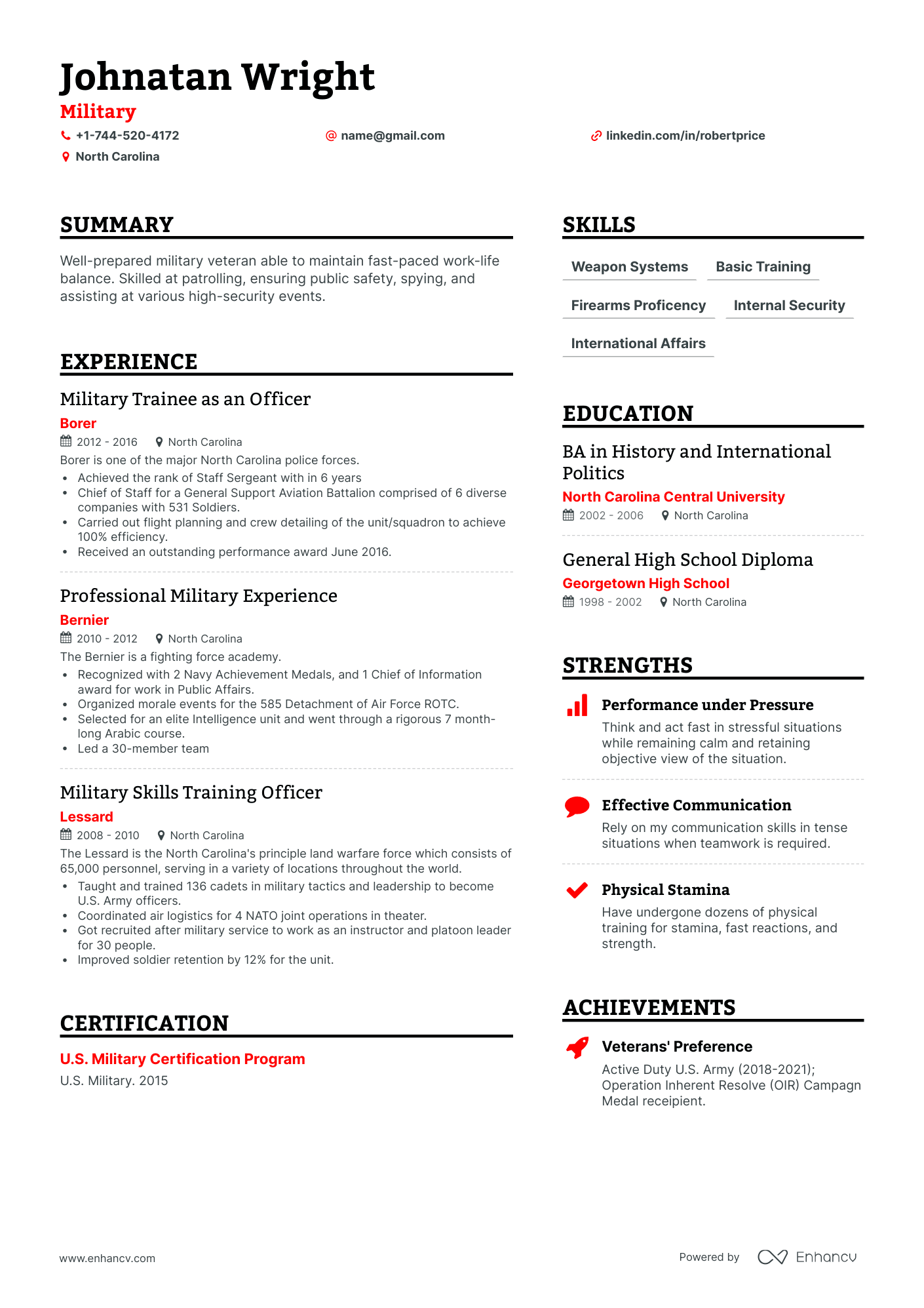
Traditional
Resume Guide
What to include in your military resume experience section, top military skills for your resume, military resume header: tips, red flags, and best practices, craft a strong military resume summary, highlight your education, certifications, and courses, drafting a job-winning military resume, other sections worth including in your military resume, a military resume that stands out, what makes a great military resume: key takeaways.

Top military sections that make the best resume
- Professional summary
- Experience (with numbers and results)
- Relevant skills
- Certifications
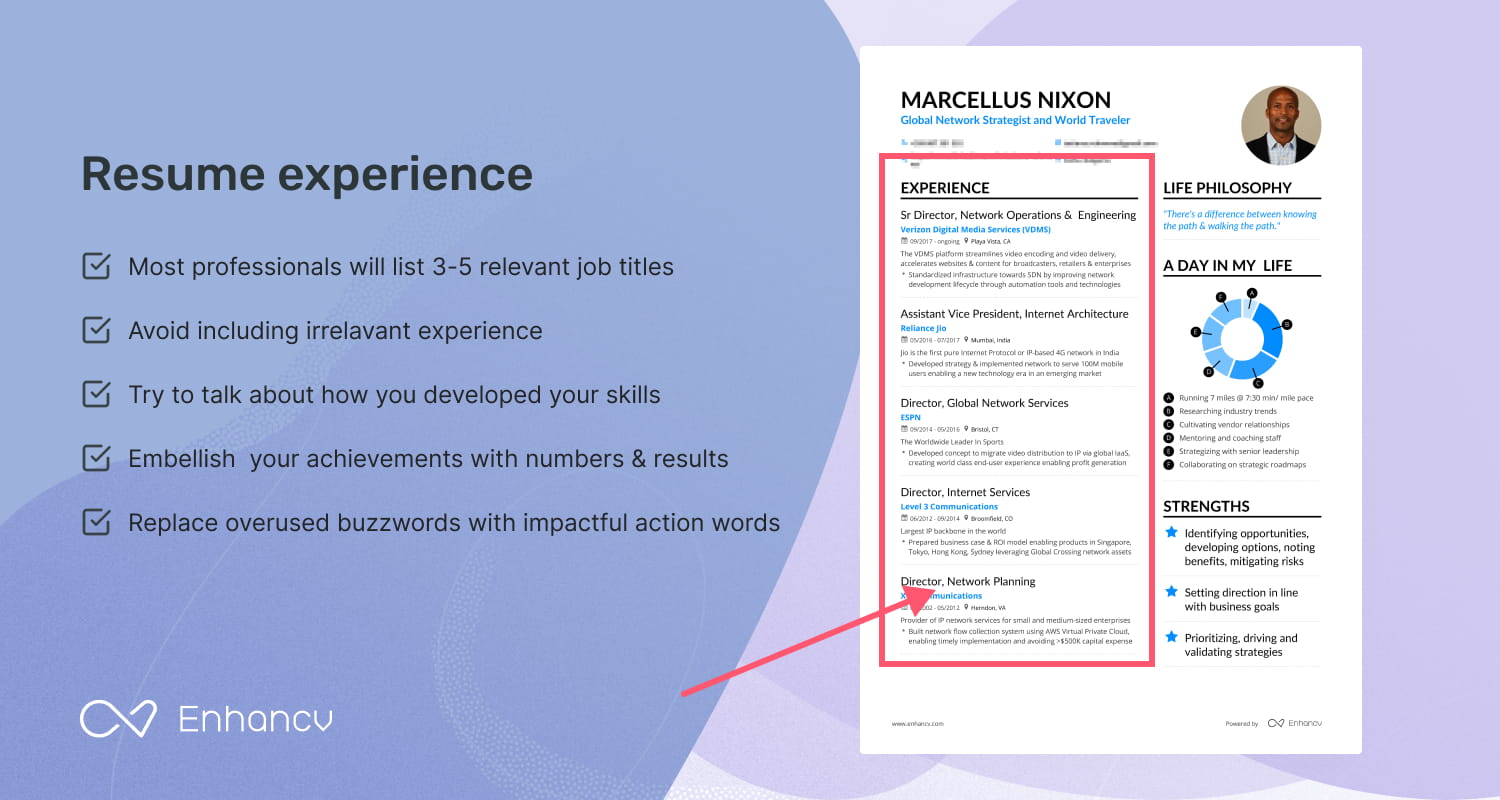
Military resume experience section checklist:
- Use at least 3 and no more than 7 bullet points per position;
- Make your experience sound relevant to what you’re applying for;
- Combine responsibilities, results, and critical situations that you’ve handled well;
- Show that you’re willing to take up on challenges;
- Include numbers in any form you like.
Looking for some real experience section examples? We’ve gathered the best Military resume samples to help you. Check them out before building your own resume!
- Partner with the Department of Defense for Repair & Overhaul or to develop Intellectual Property to repair ailing defense platforms.
- Improved Gross Margin contribution in support of Aircraft Group financial expectations.
- Developed a targeted strategy with the leadership team and reduced it to an executable plan for successful achievement.
- Supervised the International Military Education and Training (IMET) section and ensured funds and slots were fully filled to meet Host Nation requirements
- Responsible for establishing the Office of Military Cooperation’s (OMC) team houses to include locating/leasing, establishing a budget and obtaining funds for the leases and procuring furniture, equipment, and security
- Coordinated on issues with the regional affairs office, force protection office, Department of State Political-Military and Political-Economic sections and USAID to meet demand and events
- Developed and wrote pre-deployment and deployment guidelines for military members to enter the country based on DoD and DoS requirements
- Performed as primary alarm monitor for the largest weapons storage area (WSA) in the Department of Defense, supporting the largest bomb wing in the Air Force.
- Operated over $2M in sensor equipment, monitoring over 70 cameras and more than 150 alarms.
- Provided pivotal technical expertise to element leadership on compensatory measures relating to sensor subsystems security requirements.
- Weather observer to measure, monitor and report current weather conditions to air-traffic controllers, pilots and global network
- Worked in extreme weather conditions to provide real time data to assist in airport management for military aircraft and assets
- Communicated with weather stations around the world for accurate weather forecasts and mapping
- Strategic planning, identification of major priorities and release of strategic planning guidance, development of implementation and sustainability plans
- Planning and execution of organizations' mid and long term activities
- MoD resource and budget management
- Annual spend control
- Representation of Lithuanian MoD in different International organizations (governmental level)
- Political and commercial negotiations on behalf of the government
- Liaised with US and international journalists and Japanese military
- Re-engineered process for US-JAPAN bilateral approval chain
- Served as chief of media relations for USAID/DoD Afghan Army training
- TV spokesperson for Boston-area Air Force base; wrote for base paper
- Developed reconnaissance tactics, techniques and procedures to identify illegal black market border crossings in Eastern Europe
- Contributed to the design of a multi-million dollar access control point
- Trained the Afghan Ministry of Police in Physical Security and Asset Security Operations
- Managed 50+ man hours responsible for the physical security of a Secret Coalition Facility
- Improved soldier retention by 12% for the unit
- Provided security details for VIP’s and State Officials
- Successfully led teams of soldiers in combat scenarios
- Processed over 5,000 logistics requests, moving more than 500 individual personnel and over 1,000 TEUs of equipment and supplies
- Tracked and traced loads through delivery- maintaining constant communication with requestor and my superiors
- Established work relationships exclusively on phone calls
- Coordinated air logistics for 4 joint operations in theater
- Responded to many emergency situations, resulting in 0 loss of life and minimal asset loss
- Serving on a think tank to advise the chiefs of staff in war and peacetime environments.
- Collaborating with subject matter experts to prepare briefs and doctrinal evaluations of the battlefield and the operational picture.
- Only successful Minnesota graduate of an accelerated Officer Candidate assessment school in 2016.
- 2 months of officer formation
- Managed the communication of a regiment for 4 months
- Led a 30-member team
- Managed a recruiting staff of over 30 individuals to included corporate employees and contractors. Oversaw full life-cycle staffing functions initiatives within the Intelligence Community
- Developed and implemented effective recruiting strategies and techniques to improve and streamline corporate recruiting processes
- Reviewed, prioritized, and managed OCONUS deployment and intelligence job requirements to aligning best qualified candidates within the Intelligence Community (DIA, CIA, NGA, NSA, NGIC, DHS, ONI)
- Gained a total flying experience of 2585 hours involving VIP communication flights, casualty evacuation, logistic support, disaster management, emergency and flood relief operations, and training flights.
- Coordinated and supervised flying schedules and technical activities of the unit/squadron.
- Carried out flight planning and crew detailing of the unit/squadron to achieve 100% efficiency.
- Carried out flight safety initiatives of the unit/squadron involving monitoring and assessing the level of compliance and non-compliance of standards and procedures.
- Carried out general administration, performance assessment of personnel, welfare activities and recruitment of personnel.
- Carried out meetings with state and national stakeholders to facilitate flight safety initiatives as well as emergency and relief operations.
- Carried out safety information sessions and safety audits.
- Conducted investigations of administrative and flying related accidents and incidents.
- Conducted preparation of reports ans briefings as part of involvement in various military exercises involving national boundaries.
- Facilitated humanitarian civil-military coordination during various flood relief operations.
Show off real numbers that display your accomplishments in past roles. Instead of listing out your responsibilities as Military, talk about the measurable impact you made to their business. Did you boost their revenue? Increase customer retention? Mention your proudest points on your resume.
Action verbs for your military resume

Recommended reads:
- Resume Job Description: Samples & Tips To Help You Enhance Your Application
- Resume Without Work Experience: 6+ Sections to Demonstrate Impact
Military resume skills section checklist:
- Match your hard skills to the job description;
- Add keywords to pass applicant tracking systems;
- Don’t list soft skills such as ’teamwork’ – rather, mention how they’ve helped you gain success in some other sections of your Military resume;
- List only skills you actually have, keep lying out of the picture.
Top skills for your military resume
Military Operations
Troop Instruction
Quality Assurance
Strategic Planning
Military Law and Policies
Firearm Handling
Communication
Confidentiality
Decisiveness
Organisation
Empathy and compassion
Negotiation and debate
Trust and integrity
Conflict resolution
When picking skills to feature in your resume, make sure they'll be relevant to the position you’re applying to. The point of listing skills is for you to stand out from the competition. Stay away from repetitive, meaningless skills that everyone uses in their resumes. Or else, they’ll backfire and make you look like an average candidate.
- How to Create A Resume Skills Section To Impress Recruiters
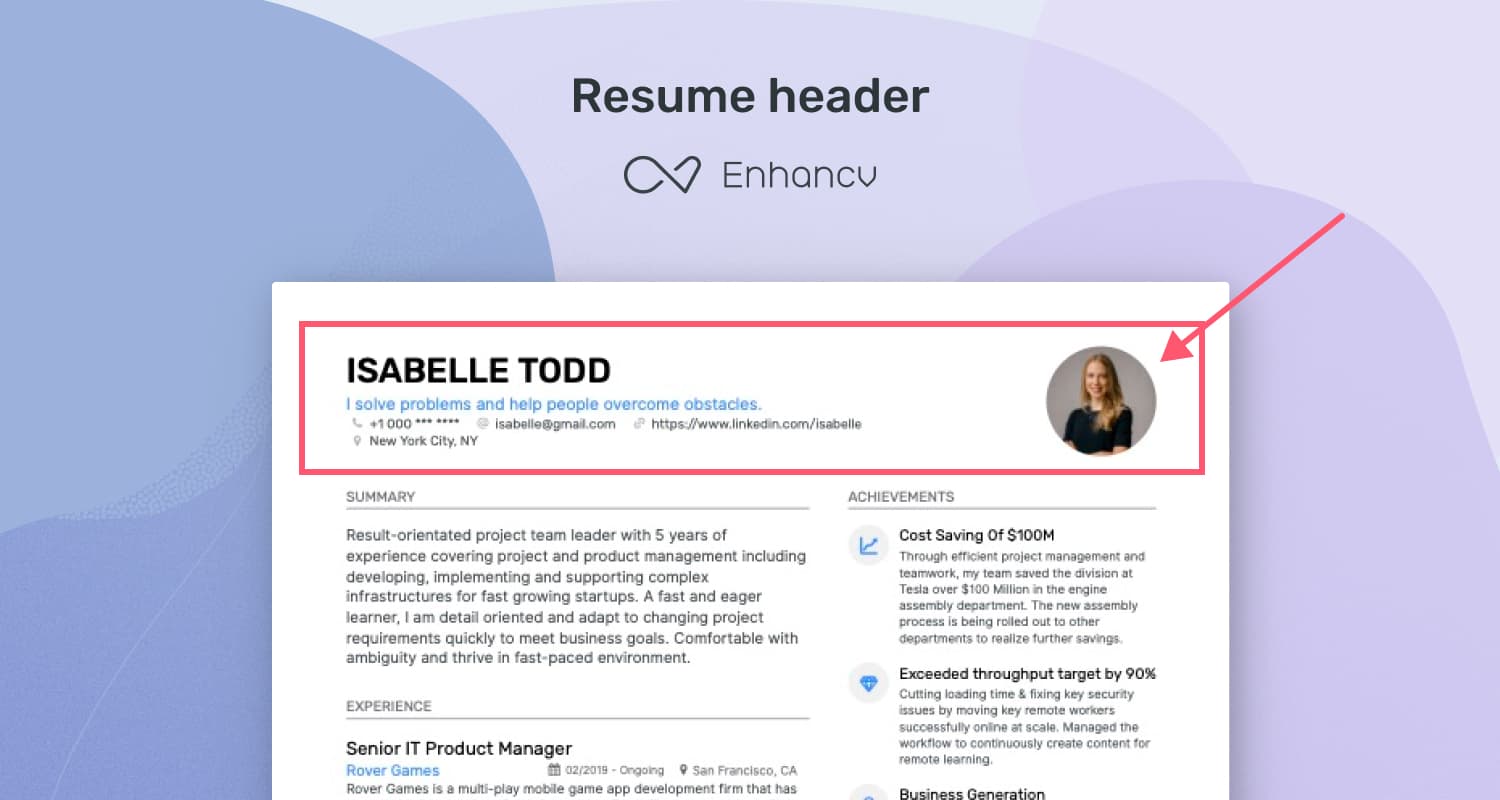
Checklist for your military resume header
- Your name and surname in a legible and larger resume font
- The job title you’re applying for or your current job title as a subheading to your name
- Link to your portfolio or online profile, such as LinkedIn
- Address (City and State for the US; just your city for rest of the world)
- Email address
- Headshot (required or welcomed in the EU; not required and sometimes frowned upon in the US)
Stick to popular email providers such as Gmail or Outlook. And use these professional formats to create your username:
- [email protected]
- [email protected]
- [email protected]
- [email protected]
- [email protected]
- How to Put LinkedIn On Your Resume
- Are Photos On Your Resume Unprofessional? [Expert Advice]
Some companies, states, and countries have non-discrimination policies about what kind of information can be included on your Military resume. This might include a photo (which is often included in a resume header and might be on personal web pages you link to). You can always email the company’s HR department to ask about their policies before you apply.
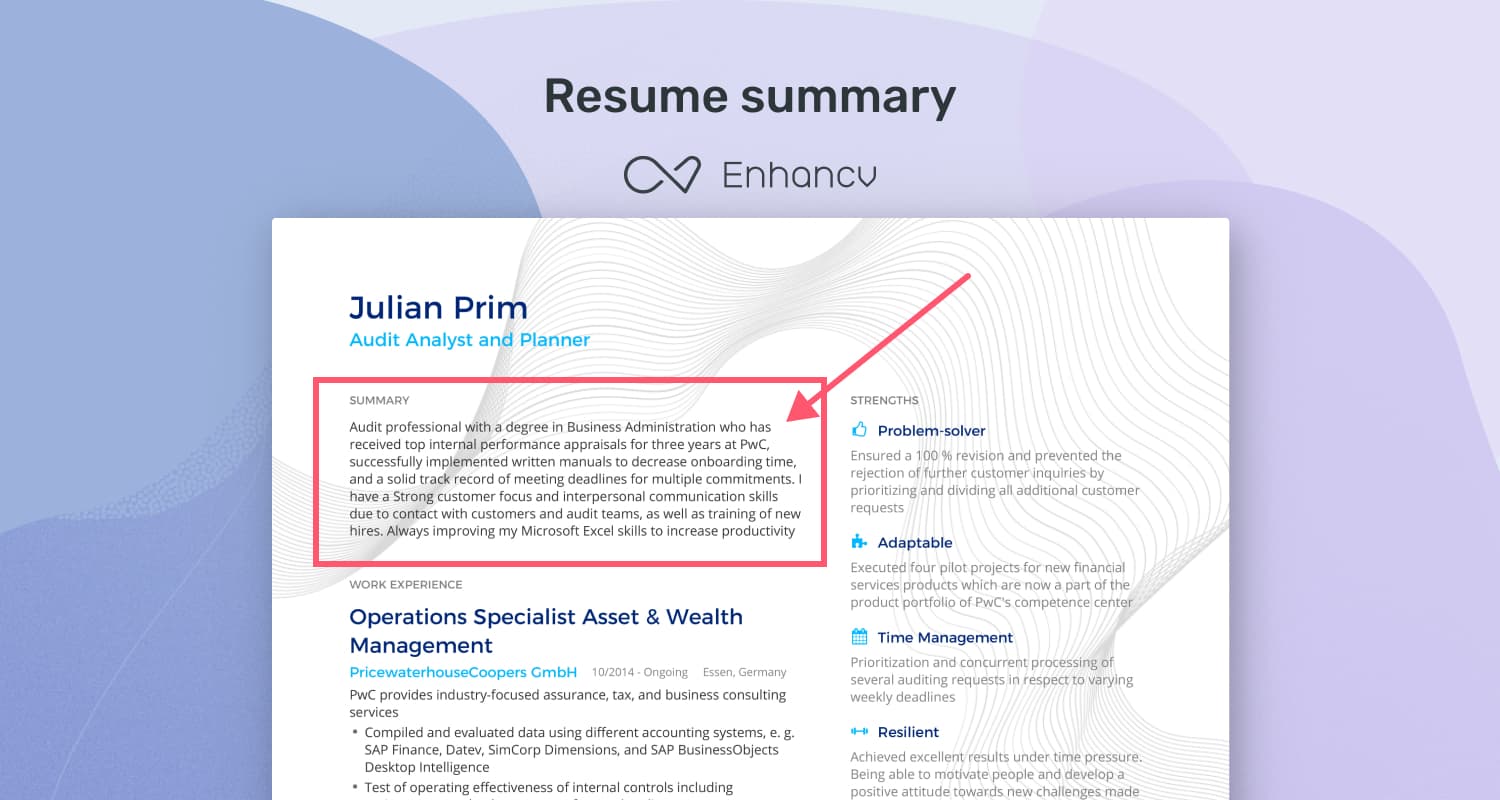
Military resume summary checklist:":
- Your total years of experience
- The industry you’re coming from
- One or two most remarkable accomplishments that have helped you - turn into a great professional
- Short sentences that add value – avoid filler words and phrases
Resume summary formula:
You’re not going to get hired simply because of a good summary or objective. However, your recruiter can bump you up in front of similarly experienced candidates who didn’t demonstrate such passion and drive.
- How To Write An Effective Resume Profile (With Examples)
What to include in your education and courses sections:
- Your highest education degree – this includes institution, course, and duration
- Certifications and courses that have helped you gain additional expertise
- Awards you’ve received as part of your education
- Entry-level positions only: relevant classes and projects
Top Certifications for Your Military Resume

Learn Military Close Combat Training | Captain Chris Pizzo
Military Hand-To-Hand Self Defense System Lets You Humiliate Younger, Tougher, BIGGER and More Experienced Attackers.

Learn Military Knife Combat Skills
The most COMPLETE and EFFICIENT self defense course for close combat using the KNIFE, designed for solo training.

VA Disability Prep: Active Military & Veteran MASTERCLASS
Veterans Affairs, VA Disability, VA Compensation, VA Eligibility, VA ebenefits, VA Health Benefits, Compensation Pension

Military Diet: Get Results After a Week Without Exercise
Learn What to Eat After the 7-Day Military Diet Plan for Long-Term Results

6 Steps to Becoming a Military Pilot
Becoming a Pilot in the Air National Guard or Air Force Reserve
Recommended Reads:
- How to List a Major & Minor on Your Resume (with Examples)
- How To List Certifications On A Resume (Examples Included)
There are dozens of certifications that you can claim as a Military. But, some are more effective than others. That’s why you mustn’t include every certificate other applicants might have. Try instead to earn and list a few of the difficult ones.
When drafting your resume, you can choose between three well-known formats :
- Reverse-chronological resume format ;
- Functional skills-based resume format ;
- Combination (or Hybrid) resume format .
Which format you decide to go for depends on two things: your personal preference and how experienced you are.
The reverse-chronological format is ideal for both really experienced people and those who joined the workforce just a couple of years ago. It’s also great if your experience combines different industries and jobs. Here, your most recent position comes at the top of your resume.
The functional skills-based resume format, on the other hand, is ideal for recent graduates or people who have no work experience whatsoever. It’s built around your skills, interests, and expertise. Ultimately, its goal is to show recruiters your biggest strengths and practical skills.
Combination resumes (also known as hybrid resumes) are great for all types of candidates – be they graduates, experienced professionals, or brave career changers. They usually follow a double-column format – one side focuses on your experience, while the other emphasizes your education, skills, interests, and accomplishments.
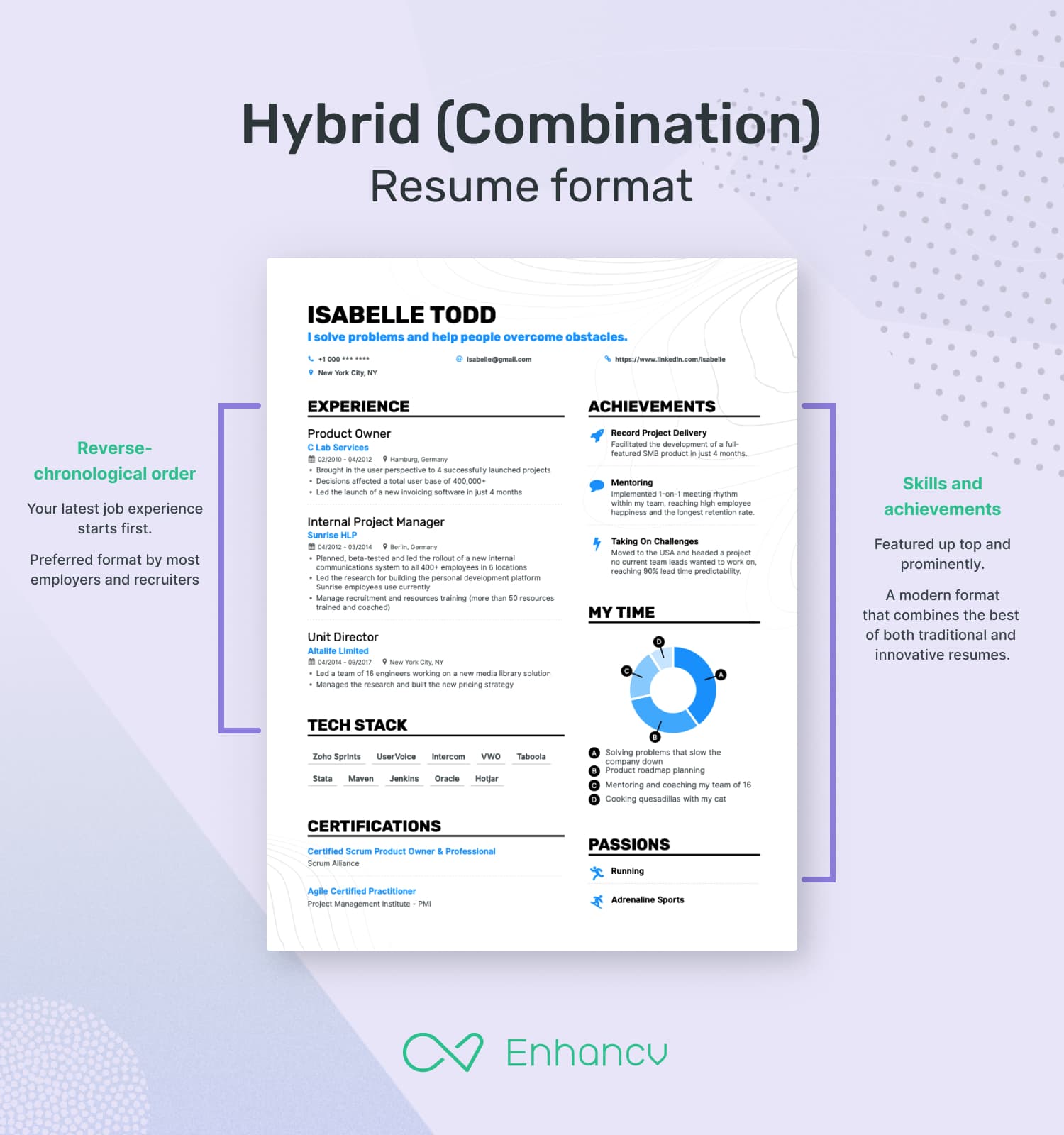
Here’s our resume format and style checklist:
- Choose a traditional resume font sized 12p;
- Go for standard 1-inch resume margins ;
- Match the length of your Military resume with your experience – choose a one-page template if you have less than 10 years of experience, and be careful with two-page templates ;
- Send your resume in PDF – in this way, you’ll avoid formatting issues and potential editing from third parties.
And in case you want to go the extra mile, check out our guide for crafting a resume that stands out .
- Resume Sections: Everything You Need to Know
- Parts of a Job-Winning Resume: How to Choose Resume Elements
Sometimes you’ll want to go after a job which requires more experience than you have. Instead of using a typical Military resume layout, you can use a creative layout. Getting noticed is the most important challenge and a creative resume layout might help you get invited for an interview as most of other accountants have boring resume designs.
Including other sections in your resume depends on the company, the position, and, ultimately, the industry. Here are some sections that will help you spice things up:
- Language skills
- Publications
- Hobbies and interests
- Volunteer work
Recruiters look at tens of resumes every day. That’s why helping them remember yours is crucial for landing an interview.
A creative resume can help you show off both your personality and your expertise at the same time.
Creative sections about passions, favorite books, quotes, and even your daily routine are a great way to make your resume feel like a breath of fresh air.
What’s more, it will also point recruiters to the fact that you’re attentive to detail and can think outside the box of Word-generated black and white resumes.
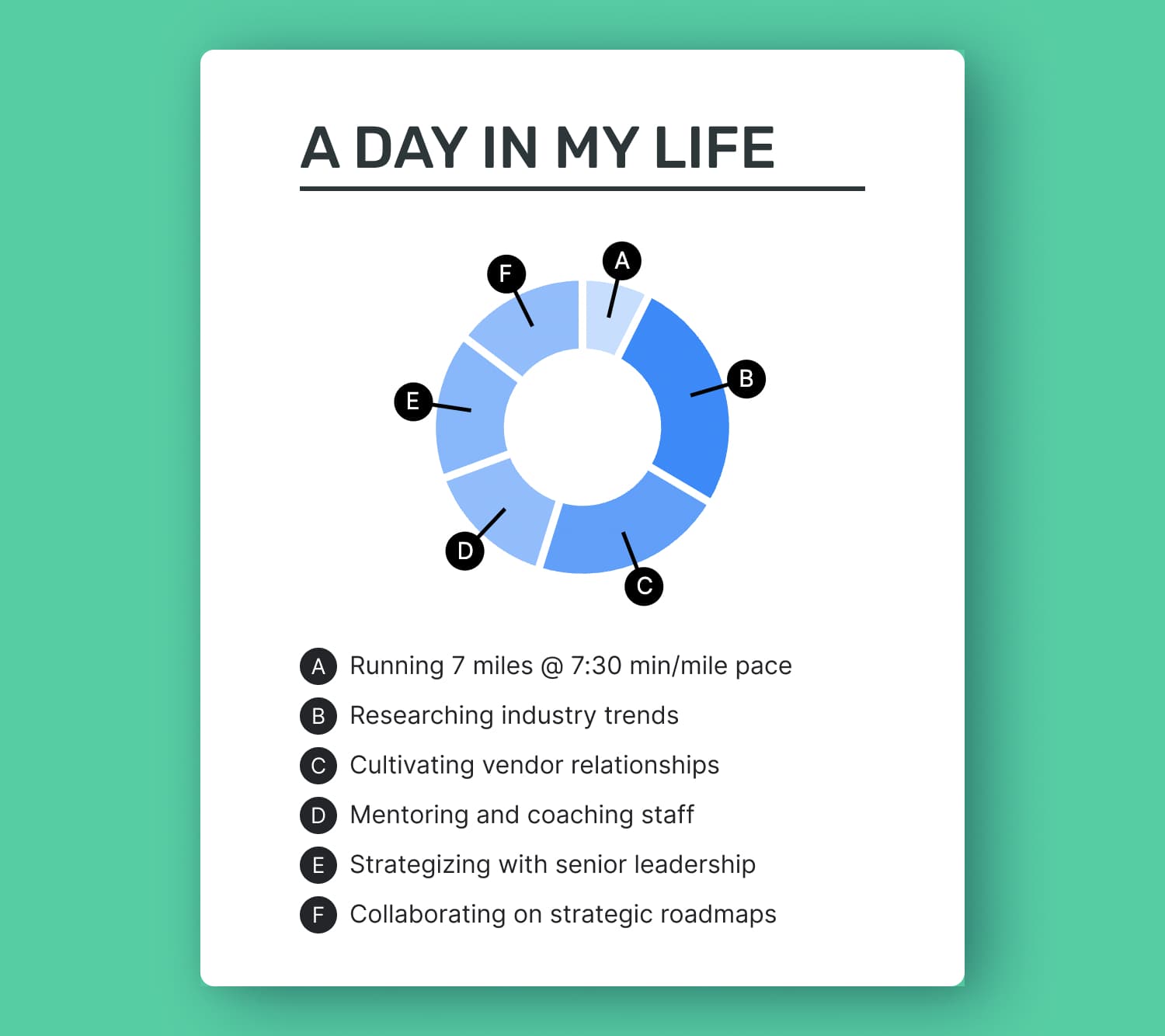
- Choose a resume layout that sends the right message across and fits your current career situation;
- Create a resume header that shows your desired job title, and easy to find contact numbers;
- Be specific about your experience, accomplishments and future goals in your summary;
- Feature detailed metrics and specific examples that show the impact you made in your previous roles when describing your experience;
- List soft skills backed by examples;
- Add all of your technical skills and certifications that you have and match the job description;
- Show off a dash of personality in your resume that will demonstrate your culture fit and the right mix of hard and soft skills.

Looking to build your own Military resume?

- Resume Examples
Best Fonts to Use On Your Cover Letter
How to write an informational interview email that lands you the interview, how to get a job after being fired: 10 sure-fire steps to get you back in the game, how to answer the “what makes you unique” interview question (with tips and examples), should i put stay-at-home mom on my resume, what should you name your cover letter file.
- Create Resume
- Terms of Service
- Privacy Policy
- Cookie Preferences
- Resume Templates
- AI Resume Builder
- Resume Summary Generator
- Resume Formats
- Resume Checker
- Resume Skills
- How to Write a Resume
- Modern Resume Templates
- Simple Resume Templates
- Cover Letter Builder
- Cover Letter Examples
- Cover Letter Templates
- Cover Letter Formats
- How to Write a Cover Letter
- Resume Guides
- Cover Letter Guides
- Job Interview Guides
- Job Interview Questions
- Career Resources
- Meet our customers
- Career resources
- English (UK)
- French (FR)
- German (DE)
- Spanish (ES)
- Swedish (SE)
© 2024 . All rights reserved.
Made with love by people who care.
- Australia edition
- International edition
- Europe edition

Baltimore bridge collapse: what we know about the bridge, ship and port
Biden laments ‘terrible accident’ as six people still missing after Francis Scott Key Bridge snapped from collision with vessel
A bridge in the US city of Baltimore has snapped and collapsed after a ship collided with one of its support columns. Rescuers are searching the water for survivors and the state’s governor has declared a state of emergency.
Joe Biden has said search and rescue efforts remain a “top priority”, as six people are still missing. The president added there was no evidence the collapse of the bridge was intentional, calling it “a terrible accident”.
Here is what we know about the bridge, the ship and the port.

Baltimore’s 1.6-mile (2.57km) Francis Scott Key Bridge was built out of steel and opened in 1977. With four lanes, the bridge is part of Interstate 695 and served as a major route along the ring road that encircles the city in the US state of Maryland.
It is named after the author of the American national anthem, The Star-Spangled Banner. The Maryland governor, Wes Moore, said the bridge had been “fully up to code” before Tuesday’s collision and collapse, indicating it met safety standards.
Live video posted on YouTube showed the ship ploughing into the bridge in darkness, with its main section collapsing into the Patapsco River below.
Several vehicles fell into the water, and officials said eight construction workers assisting with a project fell off. Six people remained unaccounted for.
One official said that sonar had detected cars in the water, which is about 50ft (15 metres) deep.
The National Transportation Safety Board is dispatching a team to investigate the disastrous collapse. Andrew Barr, an expert in civil and structural engineering at the University of Sheffield, said: “The video doesn’t show any obvious structural deficiencies with the bridge, but it will not have been designed to survive a head-on collision with such a large vessel.”

Ship-tracking data showed a Singapore-flagged container ship, the Dali, at the location of the bridge where the accident occurred at about 1.30am ET (0530 GMT) on Tuesday.
The Dali, a 290-metre (948ft) cargo vessel, left Baltimore at 1am and was headed for the Sri Lankan capital, Colombo, according to the maritime data platform MarineTraffic. The shipping company Maersk said it had chartered the vessel.
The Maritime and Port Authority of Singapore (MPA) confirmed that the vessel was registered in Singapore and said the agency was coordinating with the US Coast Guard and the ship’s management company to help. It also said it would investigate the incident itself.
Moore said the ship had lost power around the time it hit the bridge and the vessel’s crew had issued a “mayday” radio call. The ship then appeared to catch fire as part of the bridge collapsed over it, sending plumes of thick, black smoke into the air.
The shipping company Maersk said that it chartered the container ship in Baltimore, with the operator named as Synergy Marine Group. Maersk confirmed that there were 22 crew, and said they were all Indian. None of them were Maersk crew or personnel.
Reuters cited the manager of the ship, Synergy Marine Group, as saying the crew, including the two pilots, had been accounted for and there were no reports of injuries onboard.
Maersk added that there were 4,679 containers on board, roughly half of its 10,000 capacity.
The same vessel was also involved in a collision in 2016 in Antwerp, Belgium, according to VesselFinder and the maritime incident archive Shipwrecklog. At the time, the stern scraped the side of the quay, significantly damaging several metres of the hull. There were reportedly no injuries or adverse pollution and the weather was reported to be fine at the time. The incident was reportedly blamed on the ship’s master and pilot onboard.
The harbour is one of the busiest in the country and an important hub for shipping on the US east coast, especially in transporting road vehicles. It also handles farming, construction machinery and coal, according to a Maryland government website.
Port traffic was suspended until further notice after the bridge collapse.
Agencies contributed to this report
- Baltimore bridge collapse
- Water transport
- Shipping industry
- Asia Pacific
Most viewed
Middle East latest: Aid group 'coordinated movements' with IDF before deadly airstrike; Iran pledges 'harsh' response to Syria attack
Seven aid workers, including one from the UK, have been killed in an IDF strike in Gaza. Meanwhile, the Iranian consulate in Damascus, Syria, has been "destroyed", with two senior Iranian Revolutionary Guard Corps commanders killed. Iran has promised a "harsh" response.
Tuesday 2 April 2024 07:54, UK
- Israel-Hamas war
Please use Chrome browser for a more accessible video player
- Briton among seven aid workers killed in Israeli strike - group says it 'coordinated movements' with IDF
- Iran promises 'harsh' response to strike on consulate in Syria - with top commanders among seven killed
- Residents describe 'total destruction' as IDF withdraws from Gaza's largest hospital
- Dramatic before and after images show charred buildings and bullet holes
- US agrees to send more bombs to Israel
- Sean Bell: US weapons will embolden Netanyahu's negotiating position
Earlier this morning, we reported a British national was among seven aid workers killed by what appears to have been an Israeli airstrike in Gaza.
The British Foreign Office said just a few minutes ago: "We are aware of reports of the death of British national in Gaza and are urgently seeking further information."
Iran's official IRNA news agency says Tehran has sent an "important" message to the US following an alleged Israeli airstrike on the Iranian consulate in Syria.
The strike killed two Iranian generals and five officers.
Iran sent the message via a Swiss envoy in Tehran - Switzerland has looked out for US interests in Iran since the US Embassy hostage crisis in 1979.
The IRNA report did not give more details about the message, but said Iran claimed the US had "responsibility" for the strike.
Meanwhile, Iran's envoy to the UN has asked for an "immediate" UN Security Council meeting to discuss the strike.
By Alistair Bunkall , Middle East correspondent
Yesterday morning, the IDF announced they'd finished their operations in al Shifa hospital and withdrawn.
In a briefing with journalists their spokesman heralded the success of the operation and lauded the efforts taken to not harm patients or civilians. However, the pictures and stories that then emerged from the hospital told a different story and showed the medical complex in utter ruins.
Then late last night, the news that seven aid workers had been killed by an Israeli airstrike travelling on the main north-south highway.
That some of them were foreigners, including a Briton, should be of no special significance but it will naturally bring greater attention to the immense risks faced by humanitarian workers operating in Gaza, and accusations they are either being deliberately targeted or hit as a result of reckless soldiering.
This incident is a tragic example of a major, unresolved problem with deconfliction which is having a significant impact on aid and humanitarian efforts.
A senior member of the United Nations told me over the weekend that a location was bombed when some of their workers were present, despite the UN having notified the IDF of their presence.
Aid convoys attempting to reach northern Gaza have either been forced to turn back or simply not made the journey because the risk of being hit by Israeli fire was too great.
Israel has not admitted responsibility for last night's attacks, however in past incidences when they've been confident of their innocence, robust and angry denials have been quick to come.
Instead they have announced a "thorough review at the highest levels" – whether that will be enough to reassure foreign governments and humanitarian organisations, I'm not sure.
Unless something is done urgently, following this latest attack, aid workers will understandably grow increasingly wary about where they move around in Gaza , and of course the people who will be impacted most by that, will be the desperate.
Iran has blamed Israel for a deadly air strike on its consulate in Syria, in which two of its senior military commanders were killed.
Mohammad Reza Zahedi, a senior commander of the Islamic Revolutionary Guard Corps' (IRGC) elite Quds Force, died in the explosion, which destroyed the Iranian consulate building in the Syrian capital, Damascus.
Mohammad Hadi Haji Rahimi, a deputy commander in the Quds Force, was also killed, along with five other officers, according to the IRGC.
They are the most senior leaders of the force to be killed since the US assassination of Qassem Soleimani in Iraq in January 2020.
The IRGC blamed Israel for the strike, as did Iran's foreign ministry, which labelled it an "abhorrent" and "brutal" attack.
Tehran's ambassador to Damascus, Hossein Akbari, who was not injured in the strike, promised the Iranian response would be "harsh".
Read the full story here ...
Australia's prime minister, Anthony Albanese, has confirmed 44-year-old aid worker Lalzawmi "Zomi" Frankcom was the Australian national killed in the IDF strike overnight.
He said his government had contacted Israel to demand those responsible be held accountable.
"This is a human tragedy that should never have occurred, that is completely unacceptable and Australia will seek full and proper accountability," he told a press conference on Tuesday.
Mr Albanese said innocent civilians and humanitarian workers needed to be protected and repeated his call for a sustainable ceasefire in Gaza along with more aid to help those suffering from "tremendous deprivation".
In a tribute reported by Australian broadcaster SBS, Ms Frankcom's family described her as "brave and beloved".
"We are deeply mourning the news that our brave and beloved Zomi has been killed doing the work she loves delivering food to the people of Gaza," they said.
"She was a kind, selfless and outstanding human being that has traveled the world helping others in their time of need.
"She will leave behind a legacy of compassion, bravery and love for all those in her orbit."
World Central Kitchen says it is "devastated" to confirm seven members of its team have been killed in an IDF strike on Gaza.
The aid group said the volunteers were travelling in two armoured cars branded with its logo and a soft-skin vehicle.
"Despite coordinating movements with the IDF, the convoy was hit as it was leaving the Deir al-Balah warehouse, where the team had unloaded more than 100 tons of humanitarian food aid brought to Gaza on the maritime route," it added.
World Central Kitchen chief executive Erin Gore said: "This is not only an attack against WCK, this is an attack on humanitarian organisations showing up in the most dire of situations where food is being used as a weapon of war.
"This is unforgivable."
The foreign nationals killed were from Australia, Poland, the UK and a dual citizen of the US and Canada.
Ms Gore added: "I am heartbroken and appalled that we - World Central Kitchen and the world - lost beautiful lives today because of a targeted attack by the IDF.
"The love they had for feeding people, the determination they embodied to show that humanity rises above all, and the impact they made in countless lives will forever be remembered and cherished."
The charity has paused its operations in the region.
The charity employing the five aid workers killed in an airstrike in Gaza has called their deaths a "tragedy".
World Central Kitchen said it was aware of reports that nationals from Britain, Poland, Australia and Palestine, had been killed while supporting its humanitarian food delivery efforts.
"This is a tragedy. Humanitarian aid workers and civilians should NEVER be a target. EVER," it wrote on X.
Following on from our post below, the IDF has said it is "conducting a thorough review at the highest levels" after the deaths of five aid workers - including a British national - in an airstrike in central Gaza.
Nationals from Poland and Australia were also killed, as well as one Palestinian, who was driving the car they were all travelling in.
In a statement shortly after the announcement from the Hamas-run Gaza government media office, the IDF said: "Following the reports regarding the World Central Kitchen personnel in Gaza today, the IDF is conducting a thorough review at the highest levels to understand the circumstances of this tragic incident.
"The IDF makes extensive efforts to enable the safe delivery of humanitarian aid, and has been working closely with World Central Kitchen in their vital efforts to provide food and humanitarian aid to the people of Gaza."
A British aid worker is among five volunteers killed by an Israeli airstrike in central Gaza, the Hamas-run Gaza government media office has announced.
A Palestinian, a Polish and an Australian national were also killed - and the identity of the fifth is unknown.
The volunteers were understood to have been employees from World Central Kitchen - a charity devoted to providing meals to those in need.
There was no immediate comment from the Israeli military or World Central Kitchen.
Read more on the developing story below...
The Israeli military has withdrawn from Gaza's largest hospital after a two-week raid.
It said dozens of Hamas and other fighters had been killed and vital intelligence seized.
Israel has accused Hamas of using hospitals for military purposes and has raided several medical facilities.
Health officials in Gaza deny those claims.
Be the first to get Breaking News
Install the Sky News app for free


COMMENTS
Use numbers to highlight, if possible. For example, "Managed budget of $100K" or "Reduced training time from 26 weeks to 24 weeks.". Be concise. Limit your resume to one or two pages. Include volunteer experience if it's relevant to the job. Volunteer experience can add to credibility and character.
Use the federal agency's online resume builder. Copy and paste sections from your master resume into the online resume builder website of the federal agency that you are applying to. You can also create a hard copy of your resume if a federal agency requires one. Choose your words carefully. Human resources staff, or a computer program, will ...
Here's another military resume example: Security Specialist - U.S. Marine Corps 2008 to 2011. Led and mentored a diverse team of 25 people, attaining a 5% increase in promotions and 20% decrease in turnovers. Received recognition for reporting and documentation accuracy.
2. Make a list of your military duties to determine if they're relevant. Once you know what type of civilian job you want, think about all your duties as a veteran and make a comprehensive list of your accomplishments. At this step, you can use military terminology if it helps you make the list.
Oversaw the procurement, transport, and distribution of supplies to troops for military operations, including food, medical supplies, ammunition, and fuel. Led a team of 10+ army personnel to manage inventory and logistics, assigned responsibilities, evaluated performance, and ensured adherence to army standards. 3.
Content. Top ↑ Military to Civilian Resume Example (for Veterans) How to Write a Military Veteran Resume (8 Easy Steps) #1. Pick a Functional Resume Format #2. Include Contact Information #3. Capture the Hiring Manager's Attention with a Military Veteran Resume Summary #4.
Craft the perfect resume with the MySECO Resume Builder available through the MySECO website. View the Steps. Other MySECO Services. Be sure to visit the Military Spouse Employment Partnership Job Search to view job opportunities with employers that have committed to recruit, hire, promote and retain military spouses. You can search by job ...
Military resumes differ from civilian resumes in several ways. Military resumes use terminology and acronyms that may be unfamiliar to civilian hiring managers. ... As a military spouse, it can be tough to build and maintain a career due to the frequent relocations and unpredictability of military life. However, with the right resume and job ...
Military-to-civilian resume example William Smith 555 Liberty Way Portland, OR 97035 555-555-5555 [email protected] Summary Aircraft mechanic and crew leader with 10 years of experience leading teams of up to 6 technicians to maintain all aircraft systems of multiple airframes. Dedicated to efficiently balancing productivity, quality and safety to ensure customer needs are met.
For example, if you managed military recruits, and you're applying for a management position, be sure to list leadership, team management, communication, and coordination among your key skills. Always lead off a bullet point beneath your job title with an action verb. For a military to civilian resume, some of the best power words to employ ...
Use these tips to write a federal military resume: 1. Include your contact information. At the top of your resume, include your full name, phone number and email address. For federal resumes, also include a mailing address. Federal hiring managers use this information during the candidate assessment process. 2.
Here are three tips any MOS, NEC, or AFSC should keep in mind when writing a military-to-civilian resume. Examples will be listed throughout the text to give you a rough idea of what to write about (even if your industry isn't listed). 1. Plan your career path before being discharged.
How to write a military resume. Writing your military resume should follow the same basic format as all other resumes. It should consist of the following sections: The resume header. The resume summary (aka profile or personal statement) The employment history section. The resume skills section. The education section.
As seen in 1. Create your resume Get the job 2x faster*. Your career in the military has provided you with all sorts of valuable professional skills. From logistics to cybersecurity to construction to combat, military careers are vast and varied. No matter your role, when it's time for your military career to end, you need to build a military ...
1. Translate your military job titles. The initial read-through of the resume is usually a quick scan. One of the areas that are often looked at first are your job titles to determine if your experience is relevant. The job titles listed on your resume must be free of military terminology and acronyms.
Use the military resume template in this guide. It uses military experience on a resume the right way. Translate military skills to your civilian resume. Kill the acronyms and show how you used skills listed in the job offer. Write a military resume objective that gets noticed. In it, put your 2-3 best assets.
When writing your veteran resume, make sure you choose skills that are related to the job you're applying for according to the job description. 7. Add any training or education you earned. Regardless of the job you're pursuing, include the degrees or certificates you earned before joining the military and after.
Made for Success in 2024. Your multifaceted role in the military could cover anything from groundwork or combat to manufacturing or communications. With unmatched expertise, you anticipate challenges and avert conflicts proactively, making decisions under pressure with ease. The skills you amass during your service—leadership, adaptability ...
The VMET is a thorough document outlining your entire military career and it will include an equivalent to use in your resume. For example: Dates: June 2021 - Present (2 years 8 months) Organization: US Army, 1st Infantry Division, 2nd Brigade Combat Team, Alpha Company. Location: Fort Hood, TX.
Resume services can take the stress out of writing a military-to-civilian resume, but service members and veterans do have other options, many of which are free. The U.S. Department of Veterans ...
Returning from the military to civilian life and finding a government or private sector job might seem like an overwhelming task. But if you've spent some time in uniform as an officer or enlisted person, and you've been through basic training, cruises, and deployments, then you should be confident in your abilities and accomplishments - just get ready to tackle the resume creation ...
Here's our resume format and style checklist: Choose a traditional resume font sized 12p; Go for standard 1-inch resume margins; Match the length of your Military resume with your experience - choose a one-page template if you have less than 10 years of experience, and be careful with two-page templates;
Fill out your profile completely and hit 'Save.'. For more information, visit https://myseco.militaryonesource.mil/ or call Military OneSource at 800-342-9647. The Resume Builder automatically templates and select 'New Resume' to create your own. Select 'Build Your Resume' from the Quicklinks section located in the right sidebar.
Availability: December 1, 2024. Job Type: Permanent. Work Schedule: Full Time. Target Location: Philadelphia, PA. 2. Outline your federal experience in a compelling list. When applying for jobs in the private sector, you may opt to leave off older jobs and experiences that aren't aligned with your current career goals.
Biden laments 'terrible accident' as six people still missing after Francis Scott Key Bridge snapped from collision with vessel
The Israeli military has withdrawn from Gaza's largest hospital after a two-week raid. It said dozens of Hamas and other fighters had been killed and vital intelligence seized.